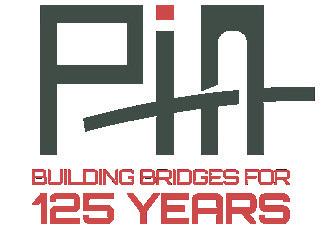
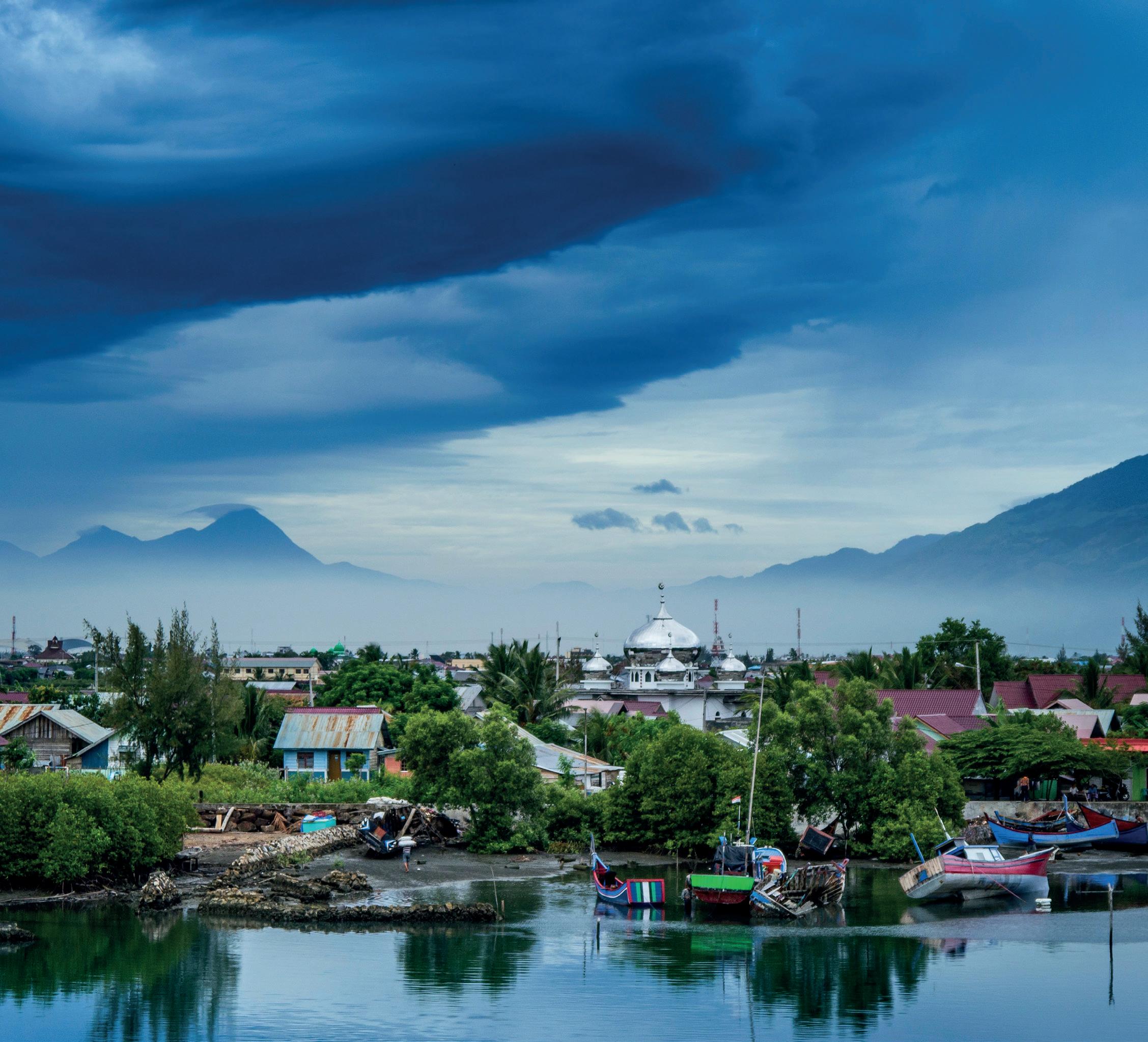


PA C I F I C BRI DGE S | | NEWSLETTER OF PRINCETON IN ASIA | | 2 0 2 3 - 2 0 2 4 ISSUE Princeton in Asia Louis A. Simpson International Building Princeton University Princeton, NJ 08544 Phone: 609.258.3657 contact@princetoninasia.org www.princetoninasia.org H e ar f r o m ou r Fellows in A s i a New Tr ustees an d B o ar d Le a de r sh i p Celebrating our philanthropic champions p . 2 - 3 p . 8 p . 17 - 1 8 Princeton in Asia at 125 p.12-14 A LEGACY OF LEARNING
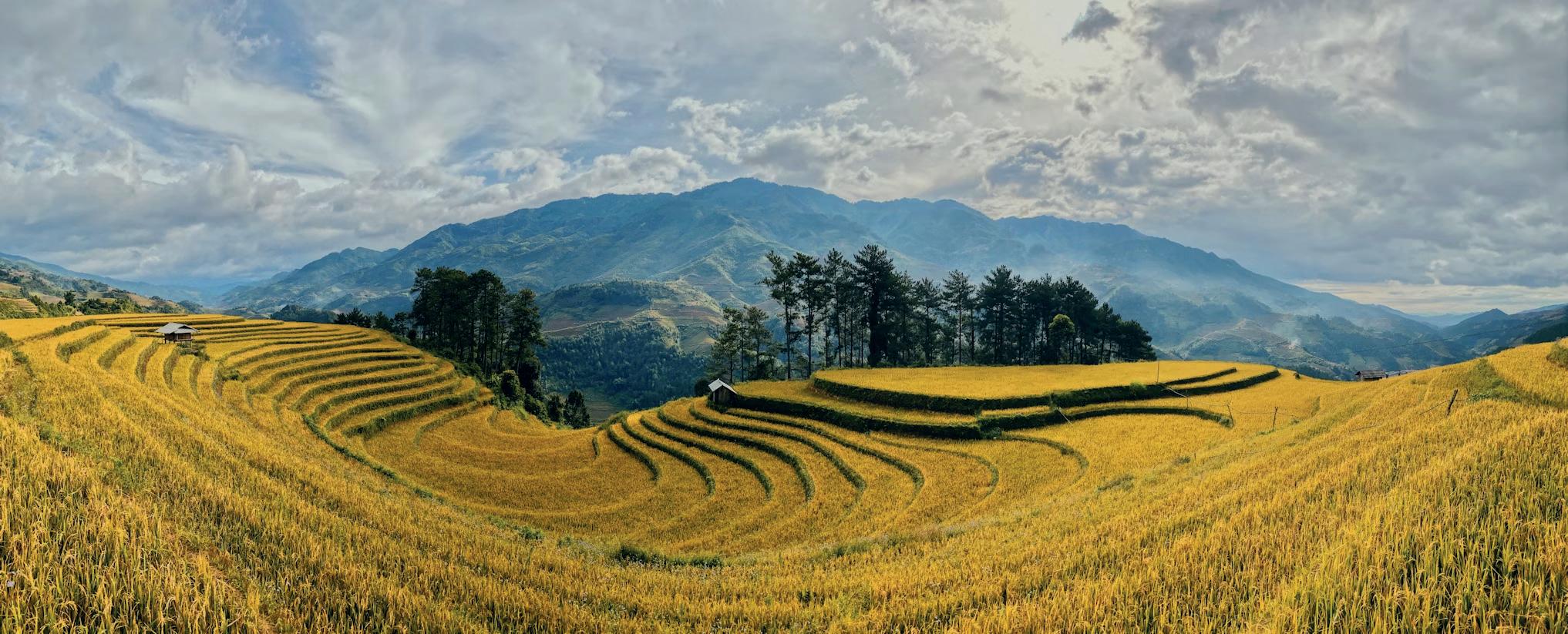
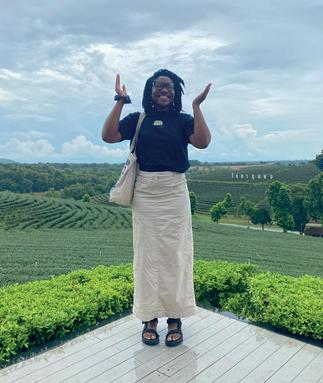
JULIA BULLOCK
DAYO ADEBAWO
Before I came to Thailand I was nervous about teaching at the university level. I hadn’t taught at that level before, so I wasn’t sure how it was going to go. But now that I have spent time in my host country, I learned that my fears were unfounded!
The other international lecturers truly welcomed us with open arms and hearts and have been so kind with advice, resources, and recommendations. I have also learned that my skills as a teacher have only grown since getting here and I’ve enjoyed getting to know my students along the way. I was able to participate in a one day English camp at Paa Bang Primary school with my co-Fellow Julia Bullock and some of the other teachers, and it was awesome seeing how excited the kids were to learn. It has only been a month since I started teaching here at MFU, and I have already grown in so many ways!
Before I came to Thailand, I thought I would struggle to build a supportive social network. But now that I have spent time in my host country, I have learned how willing my coworkers and others outside my host organization are to introduce me to new things and new adventures, and their generosity and kindness have helped make the transition to life in Asia fun, exciting, and comfortable.
I have just begun learning Thai alongside my co-Fellow Dayo Adebawo. Just recently we were able to communicate with our landlady without using Google Translate. She has been so incredibly welcoming to us, and therefore this has been a goal of ours since the very beginning of our Thai lessons. Our landlady often attempts to ask us about our day in Thai, and the other day she caught us coming back from a night market. We were able to successfully ask her how she was, tell her what we ate, and even describe the food as "aroi jing jing" (very yummy)...all in Thai!
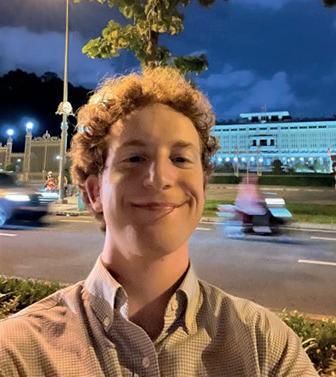
HUGH GOLDSTEIN
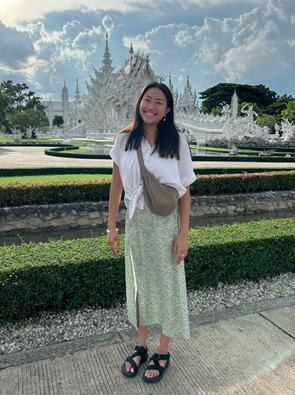
Before I came to Vietnam, I thought Ho Chi Minh City was pretty insular. But now that I have spent time in my host country, I have learned that Ho Chi Minh City is home to such diversity in every sense of the word.
Even though I am from New York City, I do not feel as if anything could have truly prepared me for the sheer amount of life in Ho Chi Minh City. One of my favorite observations has been alleyways. In just a singular alleyway, there is an unimaginable amount of homes, businesses, and restaurants, all of which hold their own amazing histories and stories. I have been quite embarrassed by my Vietnamese, but I had one Grab driver who loved my broken Vietnamese and my very curly red hair. He was so patient with me and built up my confidence, and I was also able to teach him some English. It was such a lovely exchange of language and laughs.
FEL L O W V O I CE S FEL L O W V O I CE S
EFLEC TI ONS & PH O T OS F R OM PiA FELLOWS I N A S I A
R
| Mae Fah Luang University | Chiang Rai, Thailand
| Tractus Asia Ltd. | Ho Chi Minh City, Vietnam
2
| Mae Fah Luang University | Chiang Rai, Thailand
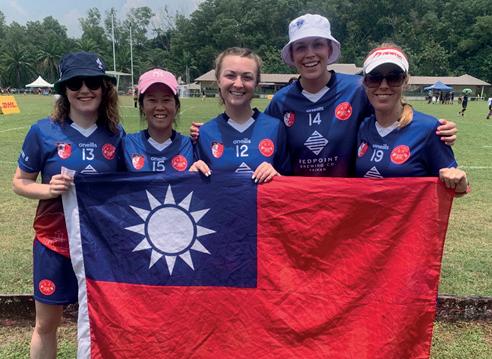
HANNAH SEMMES | Center for Asia-Pacific Resilience and Innovation | Taipei, Taiwan
Before I came to Taiwan, I thought that China wanted to colonize Taiwan. But now that I have spent time in my host country, I have learned that the history is much more complicated than that.
My favorite food right now is mango shaved ice and I am a loyal patron at CAT.jpg Cafe near Dongmen, where I get to hang with the resident tabby Bae Bae. Thanks to the loving, generous patience of the people who work there, my colleagues, language exchange buddies through Facebook, and my Chinese teacher, I have upgraded from 不好意思 (bù hao yì si, excuse me) and 咖 冰的 (kāfēi bīng de, iced coffee) to pleasantries, reading menus, and navigating the MRT. Thanks to a PiA alumni introduction, I also played with the local team at the Asian Gaelic Games in Kuala Lumpur (me in the center of the photo!) in September.
HESU SONG | University of Finance and Economics | Ulaanbaatar, Mongolia
Before I came to Mongolia, I thought that life here would be largely rural. But now that I have spent time in my host country, I learned that more than half of the population lives in the capital city, Ulaanbaatar - a very sprawling, urban area.
I have also sought out opportunities to visit the countryside. In my most recent trip, a couple PiA Fellows and I visited the Elsen Tasarkhai desert-plains. Apart from the fun we had with riding camels, tasting fresh horse milk, and sleeping in a ger, spending the night there was a restorative experience for me. When you’re living halfway across the world, it’s natural to wonder if you really are in the right place. However, that night, as the moon set, and my eyes laid upon the clearest view of stars I’d ever seen, I had this sure feeling come over me that I am in the right place - giving me renewed confidence for whatever lies ahead during my year in this country.
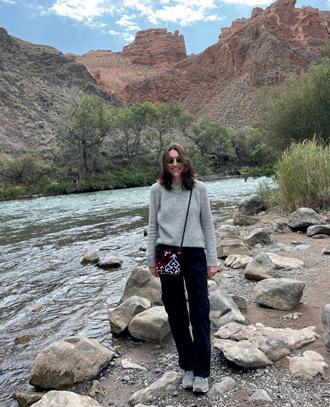
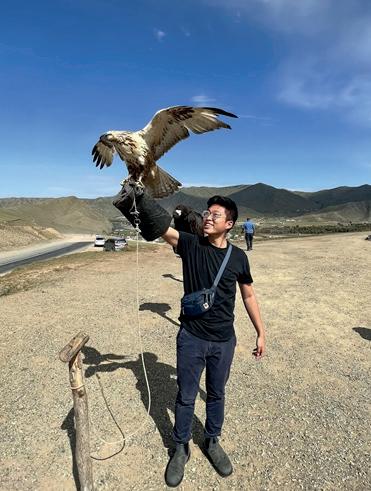
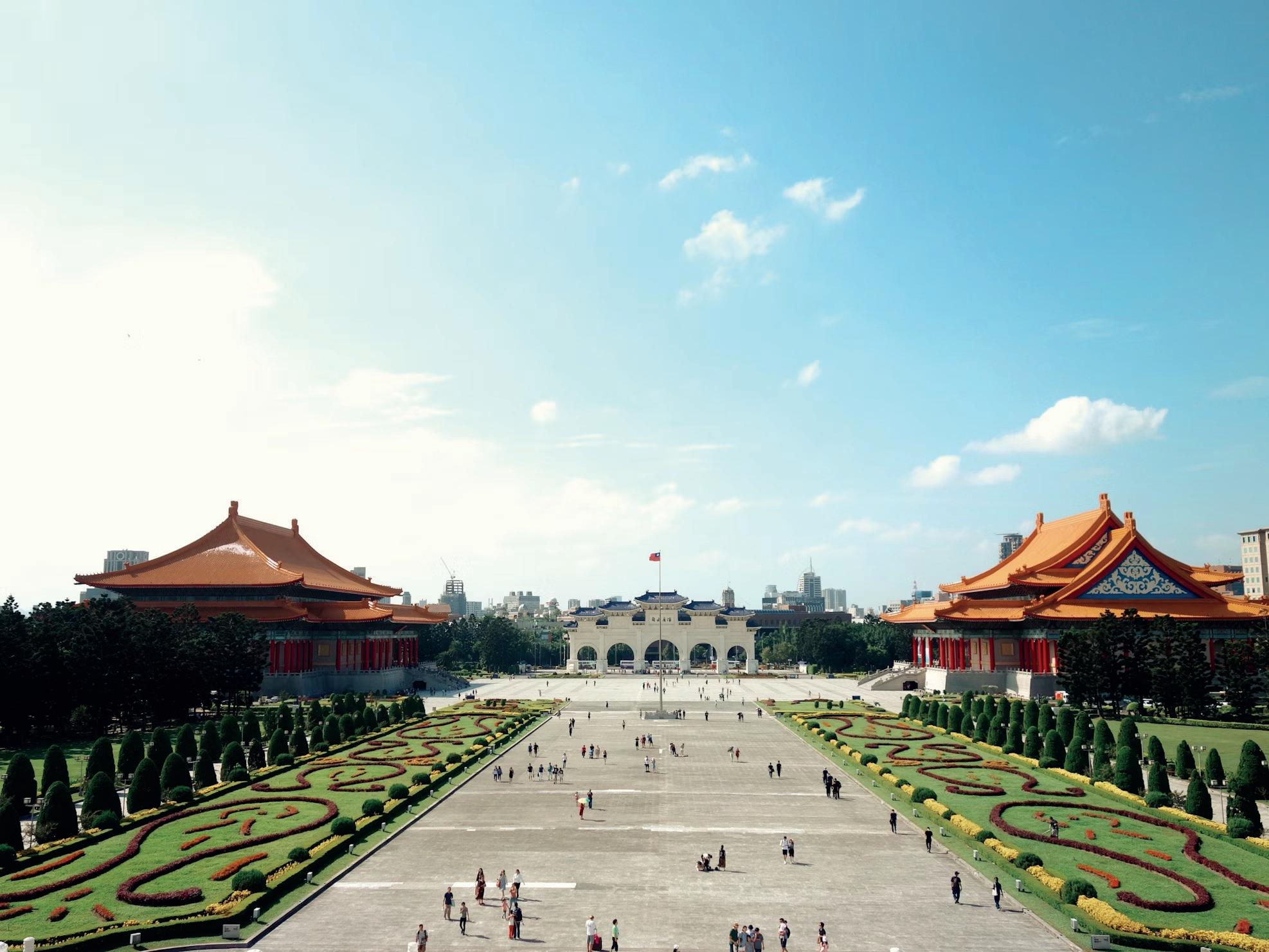
HADLEY TRAHAN | Narxoz University | Almaty, Kazakhstan
Before I came to Kazakhstan, I thought I understood the meaning of hospitality. But now that I have spent time in my host country, I learned that (/have realized that) Kazakh people continue to redefine what it means to be a friendly and conscientious host. Their generosity comes from the heart, and I am constantly in awe of the lengths colleagues take to make me feel welcome and at home.
Almaty is a fascinating city rich in history, culture, and scenic mountain views. My first three weeks in-country have been nothing short of epic; I've hiked to the top of Furmanov Peak, marveled at the beauty of Charyn Canyon, listened to traditional Kazakh music, purchased produce at the Green Bazaar, fallen in love with beef manti, and so much more! Each day brings with it a new adventure, an opportunity for growth, and countless heart-warming interactions with the local community. My colleagues at Narxoz University continue to blow me away with their kindness, generosity, and hospitality. I feel incredibly fortunate and very excited for the year ahead.
FEL L O W V O I CE S
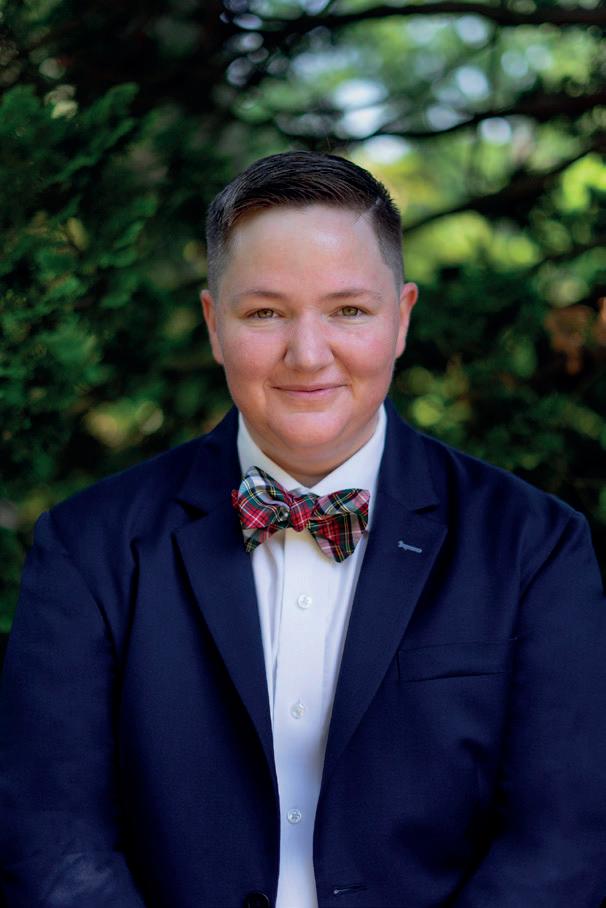
Dear PiA Alumni, Family, and Friends:
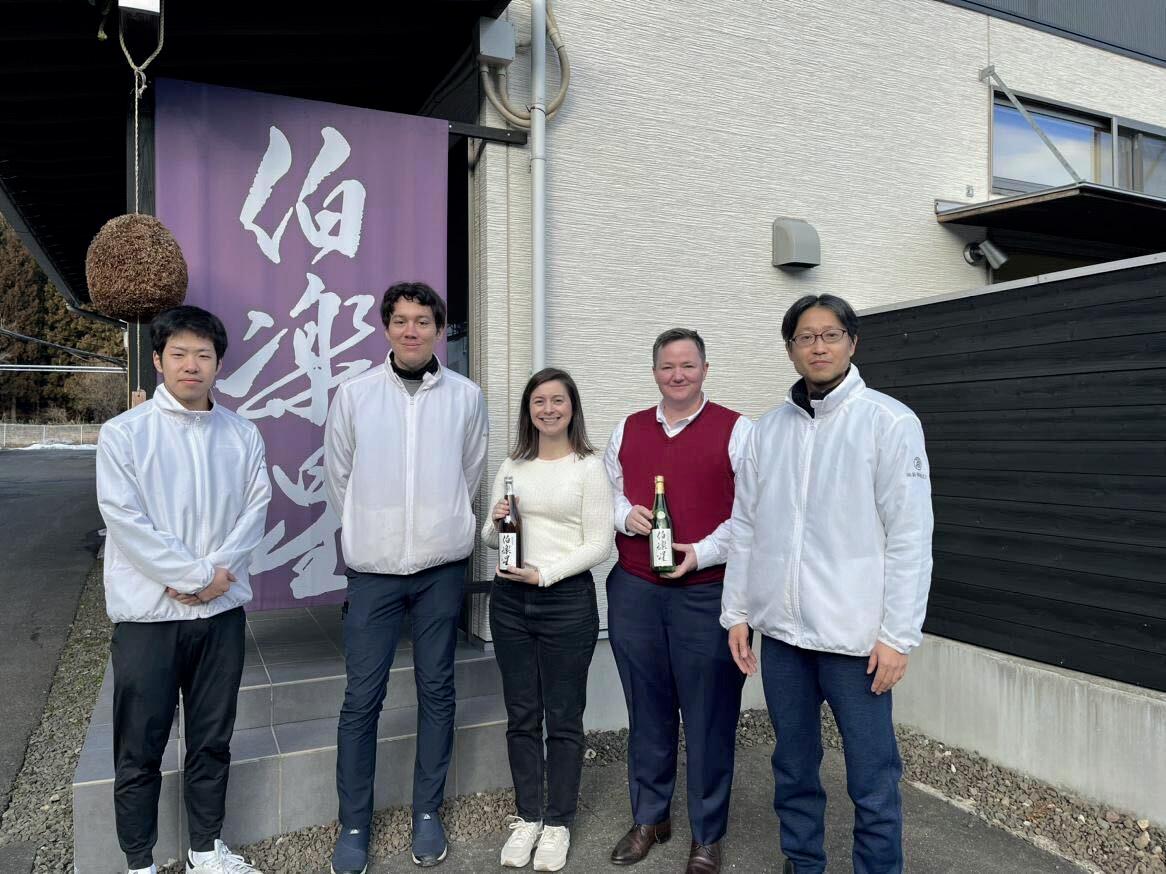
One of the most meaningful experiences in my travels this year was borne out of a storm. In January, Trustee Teresa Velez (Japan ’07, Indonesia ’09) and I traveled to Miyagi Prefecture to meet with Chris Barksdale (Japan ’23), the second PiA Fellow posted at the Niizawa Sake Brewery. The Niizawa team treated us to a fascinating tour of the brewery that would have delighted sake aficionados and business folks alike -- there’s nothing like seeing Kaizen principles put into practice in a real Japanese production facility. Later that evening, we enjoyed a sushi dinner in Sendai served with Niizawa sake. This elevated meal was meant to prepare us for a Sunday morning hike along Matsushima Bay, one of The Three Views of Japan, or Nihon Sankei, as designated by scholar Hayashi Gahō in 1643.
The morning of the hike, we awoke to torrential downpours and warnings of gales and storm surges. Our plans out in nature foiled and several more prominent museums closed, we decided to spend the morning at a somewhat obscure museum: the Sendai City Tomizawa Site Museum. The museum preserves a fossilized forest and remains of human activity from 20,000 years ago. The exhibition space is stunning: oval, half the size of a football field, and enclosed by a thick, self-supporting concrete wall. Without any beams obstructing views of the site, visitors walk on an elevated platform around a web of petrified roots, gnarls and branches, the coalified remains of a bonfire, and a small hole where Paleolithic humans ostensibly stored knives, flakes, and hammer tools some 20,000 years ago.
The Tomizawa site was discovered by accident. As the community was preparing to build an elementary school, surveys unearthed treasures: well-preserved remains of rice fields dating from modern times to the Yayoi period, holes from the Jomon period, and below that, the epic Paleolithic forest and campfire. By accident, Teresa, Chris and I found ourselves spending our Sunday morning walking in the footsteps of prehistoric humans. It was awe-inspiring to imagine what these early humans did and communicated about around the campfire. The visit drove home to me how there are layers of history under every surface, and that wherever we walk, we follow in the footsteps of those who came before us. These lessons are germane in a season when we celebrate Princeton in Asia’s 125-year legacy of building bridges between the United States and Asia.
Our season began in October with our first Annual Dinner in Princeton since COVID, when writer and artist Hannah Bae (Korea ’07-’08) inspired us with reflections on her journey to PiA and after, and when we honored our trailblazing former chair Sharon Lyu Volckhausen (Korea ’91). Throughout the fall, we held alumni events in Singapore, Hong Kong, New York City, and Bangkok. In January, several Trustees and PiA team members traveled from across Asia and the US to Tokyo for a “Grand Reunion” with Fellows, Alumni, host organizations, and friends. Each occasion invited reflection on PiA’s history and legacy, the visionary people who planted the seeds of PiA 125 years ago, and the generous, dedicated people and institutions who have tended to PiA and its predecessors over time. These people who walked before us -and many of whom still walk alongside us -- have helped PiA to
A W O R D F R OM TH E EXECU TIV E D IR EC T O R
L-R Toi Yamagishi of Niizawa Brewery; Chris Barksdale Japan ‘23; Teresa Velez Japan ‘08, Indonesia ‘09, and current Trustee; Mags Dillon Laos ‘10-’12 and Executive Director; and Kentaro Sugihara of Niizawa Brewery.
4
weather the proverbial droughts, frosts, and fires, and to thrive into the 21st century.
If Pop Gailey’s arrival in China in 1898 to begin the work of PiA and its predecessor organizations is the innermost ring on the PiA tree, this year also brings into focus several milestone “rings”:
• the 65th anniversary of PiA’s first engagement in Japan through the Osawa fellowship
• the 60th anniversary of the first Fellow in Hong Kong
• the 55th anniversary of the first Fellow in Indonesia
• the 45th anniversary of the first Fellow in Egypt (Mr. Atmore initiated fellowships in Egypt in 1978, and they continued through 1990)
• the 30th anniversary of our partnerships with Ngee Ann Polytechnic in Singapore and Yakage Town Hall in Japan
• the 25th anniversary of the first Fellows in Laos
• the 20th anniversary of our partnership with Mae Fah Luang University in Chiang Rai
• the 15th anniversary of environmental fellowships supported by the Tiger Baron Foundation
• and the 10th anniversary of the first Fellow in Sri Lanka. Each of those rings holds the stories of people in communities and organizations in Asia and the United States who came together around the proverbial campfire to pursue a common goal: promoting respect, appreciation, and understanding across and within cultures. This transformative educational mission is central to everything PiAers do, whether they are teaching in schools, writing at a newspaper, working at a public health organization, or brewing sake. This edition of Pacific Bridges highlights PiA’s educational mission and the profound and long-lasting impact PiAers have had in the field of education.
In this edition, we also remember an important member of our community who is no longer with us, but whose contributions will have a lasting impact on PiA as an institution: Isabella de la Houssaye. Isabella served as a dedicated Trustee of PiA from 2011 until her passing in December 2023. She served on the Strategy Committee in 2015 and 2021; was founding Chair of the Program Committee (2016-2021); and was an inaugural member of the Health, Safety and Welfare and Diversity, Equity and Inclusion Committees, where she led the drafting of formative documents such as PiA’s Code of Conduct and Diversity, Equity and Inclusion statement. Nearly 10 years of Fellows will know Isabella as a generous host, who opened her home to host dozens of Fellows during TEFL and orientation. She was a generous sponsor of PiA events, activities and initiatives. In committee meetings, board meetings, and conversations, she asked insightful and challenging questions and was never afraid to share a dissenting viewpoint. She gave generously of her time, energy and expertise, even as she battled cancer over the past five and a half years. Please join me in offering our condolences and gratitude to Isabella’s husband David Crane, their five children Cason, Oliver, Bella, David, and Christopher, and their extensive network of family and friends across the world.
Yours sincerely,
 Mags Dillon
Laos ’10-‘12 Executive Director
Mags Dillon
Laos ’10-‘12 Executive Director
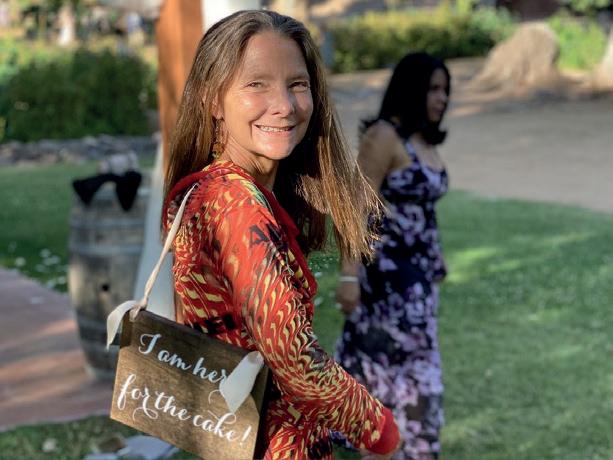
We mourn the loss of PiA Trustee and dear friend Isabella de la Houssaye, who passed away on December 2, 2023. We invited her friend Mariesa Lea (China ‘08, East Timor ‘09, and Trustee) to share a few memories of Isabella and to reflect on Isabella’s impact at PiA.
“My time with Isabella was typically between 5-6am at the Princeton Football Stadium. For many years, we met almost weekly to run up and down the stadium steps for our morning exercise. Often we’d talk about PiA; how the program was doing, fundraising goals, and the strategic plan. Isabella was deeply invested in PiA. Over the last 16 years she made tremendous contributions to PiA as a volunteer, advisor, Trustee, host, donor, and friend. Mostly though, we’d talk about life; what we were looking forward to (for her, it was usually a daunting athletic challenge) and what life challenge we were currently working through. These conversations happened before I had my own children, and as I heard about her life with her five amazing kids, I filed away pieces of advice for the day when I would become a mother. I didn’t see Isabella during her last year of her life. We were living on opposite coasts and it was the year I had my second child. The months slipped away as I cared for my newborn.
Thanks to her husband David and her daughter Bella, I was able to speak to Isabella during her last hours. I told her that I would think of her every time I swam (Isabella was a devoted swimmer) and every time I took a quick shower. Of all the advice that Isabella gave me as we climbed the stadium steps, the one I remember the most frequently is that “if you’re going to have kids and still exercise, you better learn to take a quick shower.” To clarify, “exercise” puts what Isabella did lightly. Isabella ran over 100 marathons and completed them on every continent and in every US state. She completed more than 20 Ironman races and climbed four of the Seven Summits–and she accomplished many of these feats while battling cancer.
But Isabella wasn’t only an athlete, and she was determined to not be defined by one thing. She was also a business owner, philanthropist, lawyer, mother, and avid adventurer. She asked hard questions, challenged assumptions, and gave generously. In summary, she was the kind of person I strive to be. So, today as I showered in record-breaking time–after working out and before preschool pick up–I could feel Isabella smile. I smiled back as I thought about what an extraordinary person she was and how lucky I was to have known her. Isabella made the world a better place, and we are all the beneficiaries of her amazing life.”
UPDATE FROM EXECUTIVE D RECTOR M B D LLON Photos: - Ta wan - Mongol a
IN MEMORY OF ISABELLA DE LA HOUSSAYE (1964-2023)
5
PiA AND NGEE ANN POLYTECHNIC: 3 0 YEARS TOGETHER
by Helen Cheng Mao | China ‘94
over three decades, Ngee Ann Polytechnic (NP) has hosted 159 PiA Fellows to instruct subjects ranging from engineering and business communications to film studies and psychology. In 1993, PiA Fellows Alex Volckhausen, Douglas Miller, Huan Nguyen, Kendra Hershey, Louis Nguyen, and Stephen Kowalski kicked off PiA and NP’s robust and mutually beneficial partnership. Thirty years later, three PiA-NP Fellows—Shawn Dinh, Maisie Fisher, and Al Lo—are currently in post as the first post-COVID Fellows back in the field in Singapore, along with Esha Jain, who is posted to the Milken Institute Asia Center.
As PiA Director of Programs Dr. Molly Giblin notes, "NP has welcomed generations of Fellows to Singapore. The mentorship and support they provide has allowed Fellows to hone skills in teaching, administration, and beyond, while they also develop the essential cross-cultural perspectives that will allow them to navigate lives and careers across the world.”
In celebration of the partnership’s 30th anniversary, two PiA Fellows—twenty years apart—explained what they brought to and gained from their time at NP after college graduation.
Surrounded by “very nurturing and supportive” colleagues, physics major Kathy Canning ’97 honed pedagogical skills to design lessons that explained calculus concepts effectively. Living with other curious, like-minded international teachers validated her decision to explore and work abroad. Kathy also developed a “stronger comfort level with my own independence,” navigating Singapore’s bus system and traveling through other countries with aplomb. She brought this newfound confidence back to the U.S.—“I rode the subway in Moscow [so] I could handle New York City transit.”
Kathy also performed with the National University of Singapore Orchestra and noted an interesting cross-cultural perspective. When they performed at a summer festival in Scotland, the Singaporean musicians were taken aback by the buildings’ lack of air conditioning. They were surprised by a reality unlike their
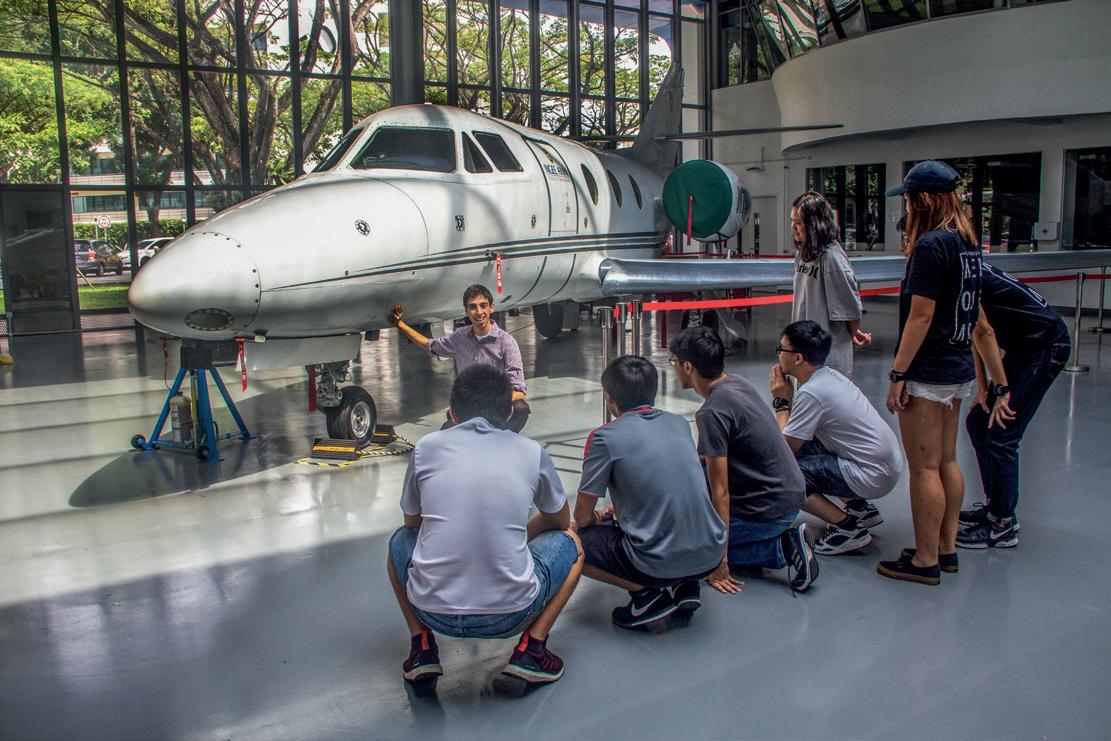
Her fellowship influenced her career in nonprofit work in education. At the organization Education Through Music, Kathy felt that “the fact that I had at least set foot in a classroom was helpful.” Having gained an “understanding and awareness of as well as appreciation for teachers,” she now is an independent development consultant and grant writer for educational and arts nonprofit organizations.
Mechanical engineering major Josh Umansky-Castro ’17 taught aerospace technology at NP. He found faculty members—many with PhDs, all with field experience—to be “very supportive and willing to get feedback from me. I was able to learn from them and their stories from industry.” When his students built and flew their own model aircrafts, Josh “had more successful flights in [his] class than any of the other teachers that year.” He also helped shape future curriculum by designing a computerized, motor-controlled catapult on which a professor later based lesson plans.
Currently an aerospace engineering PhD candidate, Josh applies skills honed at NP to his current role as Mission Manager at Cornell Space Systems Design Studio. Instructing and advising students, he believes that “I've certainly built on the experience I developed during my time in Singapore to shape me into the teacher, mentor, and manager that I am now.”

Like Kathy, Josh credits his PiA-NP fellowship to personal growth: “It was a nice realization that I'm capable of doing things that might not necessarily be qualified for…as long as I set my mind to it and put in the effort.”
He also sums up a lesson that PiA teaches everyone: “If things seem odd, or even crazy, it’s only because I have not come to understand it yet.”
HOST
| NGEE ANN POLYTECHNIC 6
Josh Umansky-Castro '17 explaining aerospace design to Ngee Ann students.
ORGANIZATION SPOTLIGHT
HOST ORGANIZATION SPOTLIGHT | YAKAGE TOWN HALL
PiA MARKS 3 0 YEARS IN YAKAGE, JAPAN
by Emily Nunez | Vietnam ‘15
Beth Landau keeps a treasured “time capsule” in her bedroom closet. The box, brimming with photos and handwritten letters, takes her back to 1993 and 1994, when she served as Princeton in Asia’s first Fellow at Yakage Town Hall in Japan.
In many of the photos, Landau—a teacher by trade—is shown grinning from ear to ear while talking to Yakage children or chasing them around the playground.
“The town folks called me ‘Momo,’ aka ‘Peaches,’” Landau fondly recalled. “I think I got the nickname from being flush from running around with the kids. I'd walk in the office with big, pink cheeks that looked like peaches. It was the cutest job in the world.”
The giggling students in her photos have grown, and many now have children of their own who are being taught by the current class of PiA Fellows. Over the last 30 years, 36 PiA Fellows have come to Yakage—a fairly small but sprawling town west of Okayama—to teach English in local preschools and kindergartens. Fellows also assist the seat of government, Yakage Town Hall, with events, festivals, and administrative tasks. “PiA is proud of our long history of working with Yakage Town Hall and deeply grateful for the supportive, immersive experience they have provided to generations of PiA Fellows,” said PiA Senior Program Director Robin Palmer. There are currently two PiA Fellows living and working in Yakage.
Mari Nakano, who works for the Town Hall, said their longstanding partnership with PiA is not only beneficial to the children, but to the entire town. “Both the preschoolers and the Yakage Town Hall staff members are able to communicate with the English teaching assistants and have an international exchange,” Nakano said. “Of course [the PiA Fellows] give English lessons, but they also actively participate in local events such as the Daimyo Procession and interact with the Yakage community.”
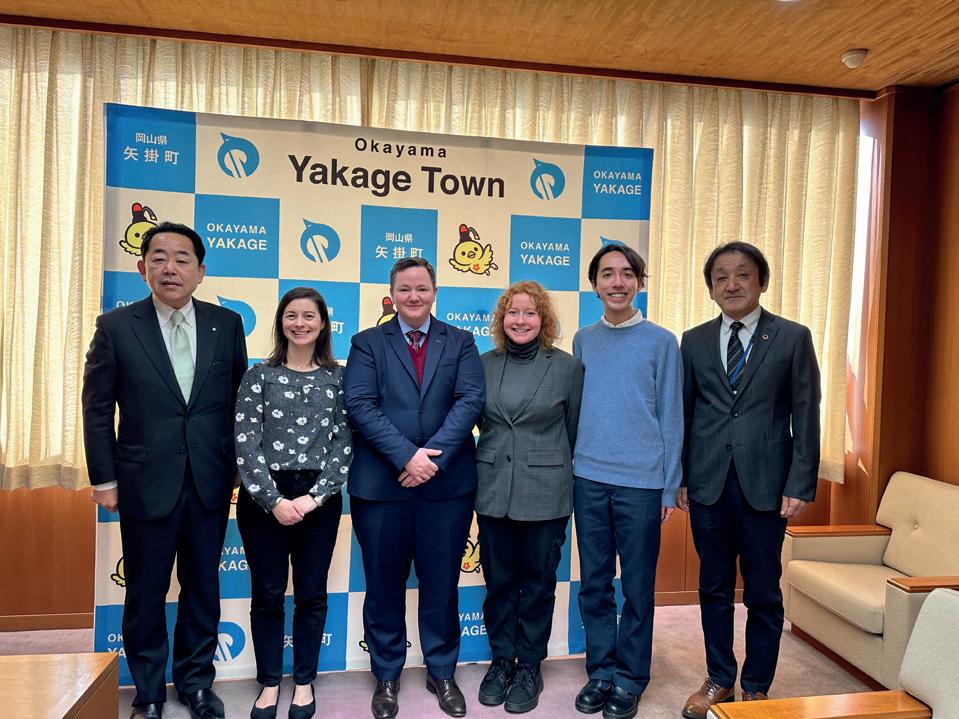
This cross-cultural exchange resonated with Roya Motazedi, who completed a 2012-14 PiA fellowship in Yakage. She started learning Japanese in an immersion school at the age of six, so the chance to teach English in Yakage “felt like a full circle moment.”
“I felt like it was my opportunity to give back what my Japanese teachers had given me when I was such a young age—not just learning a new language but being exposed to someone from a different country in a different culture,” she said. “At the end of the day, I think it reinforces that we have more similarities than differences, and it’s all about creating relationships and taking the time to learn about each other.”
She believes the Yakage fellowship is unique because it offers the rare chance to teach every child between the ages of four and six in an entire town. This enables fellows to directly connect with local families and feel more integrated in Yakage and familiar with Japanese customs.
For both Landau and Motazedi, the bonds formed during their fellowships are lifelong. Motazedi just visited Yakage in November 2023, and Landau is planning an April 2024 trip in hopes of bringing those photos in her closet to life once again.
“I loved my time in Yakage,” Landau said. “I hope my kids have this kind of adventure when they are in their twenties. I would do it all over again.”
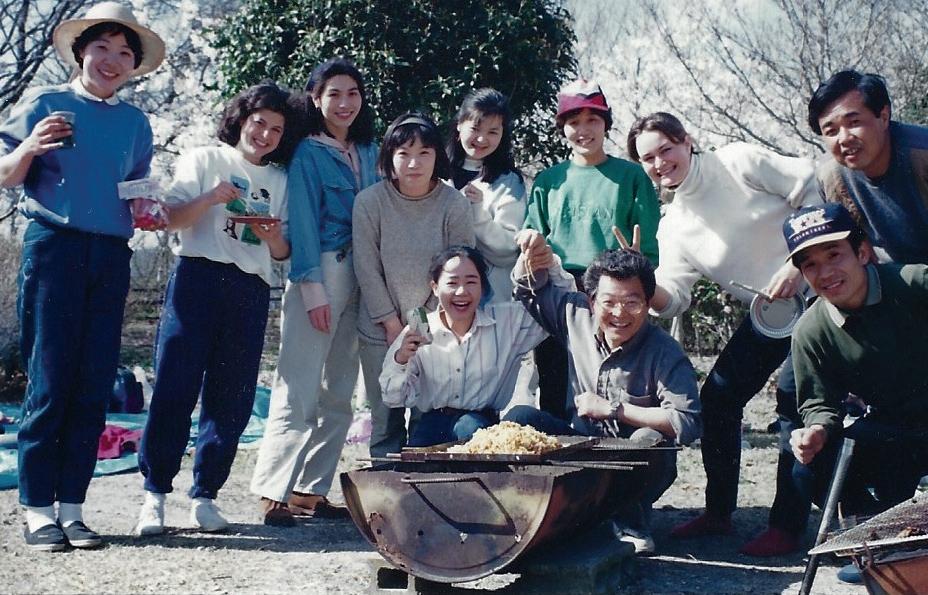
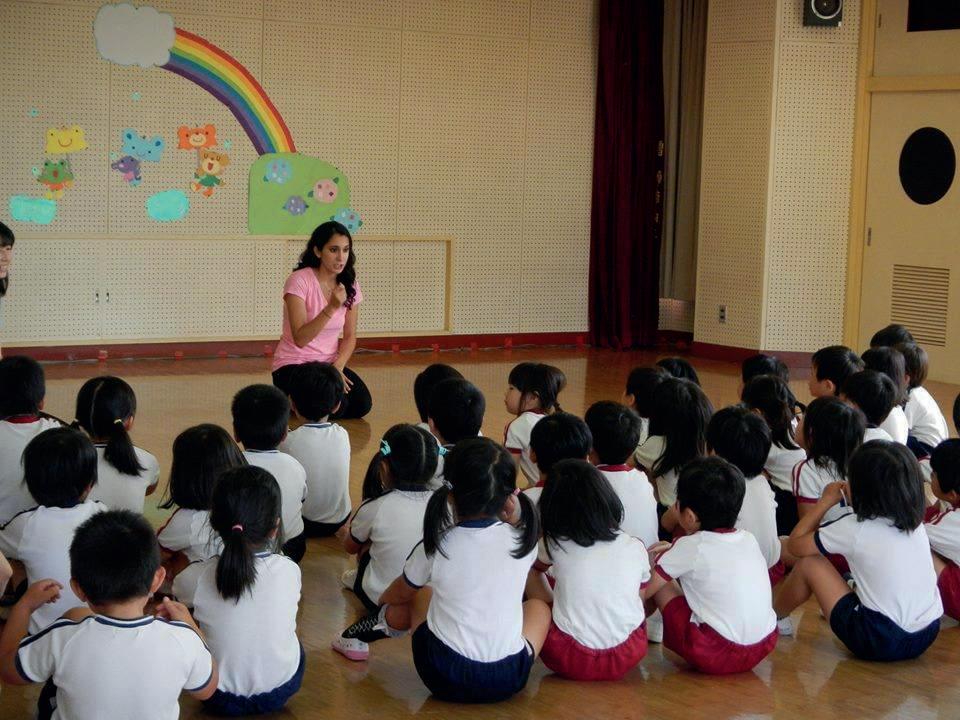 Beth (second from left) and Japan Fellow Sarah Meacham (first from right) celebrate the cherry blossom season in Yakage
L-R Yoshiharu Matsushima, Mayor of Yakage; Teresa Velez Japan ‘08 and Indonesia ‘09 and current Trustee; Mags Dillon Laos ‘10-’12 and Executive Director; Fiona Pratt-MacDonald Japan ‘23; Kenji Anderson Japan ‘23; and Yukihiro Yamagata, Deputy Mayor of Yakage.
Roya teaching young students in a Yakage school.
Beth (second from left) and Japan Fellow Sarah Meacham (first from right) celebrate the cherry blossom season in Yakage
L-R Yoshiharu Matsushima, Mayor of Yakage; Teresa Velez Japan ‘08 and Indonesia ‘09 and current Trustee; Mags Dillon Laos ‘10-’12 and Executive Director; Fiona Pratt-MacDonald Japan ‘23; Kenji Anderson Japan ‘23; and Yukihiro Yamagata, Deputy Mayor of Yakage.
Roya teaching young students in a Yakage school.
7
NEW TRUSTEES AND BOARD LEADERSHIP
Princeton in Asia is delighted to introduce the newest members of PiA's Board of Trustees: Edgar Chen, Patricia Graue, Sowa Imoisili, Marshall Roslyn, and Jennifer (Yeh) Wannenmacher. Our Trustees play a crucial role in guiding the strategic direction of our program, ensuring its continued growth and impact, and we are very fortunate to benefit from the diverse perspectives, insights, and experiences from our Board.
We are sincerely grateful to Sharon Volckhausen (Korea ‘91) for her successful seven-year tenure as Board Chair, as well as to Tom Tuttle (Indonesia ‘88) and Jim Stent, who have completed their respective 16-year and 4-year terms as Trustees. Each of them has made invaluable contributions to PiA's legacy. We also congratulate John Evans (Thailand ‘92) on his election as Chair and Bill Bikales on his election as Vice Chair of the Board.
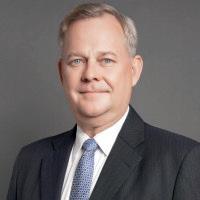
JOHN EVANS, Board Chair
Thailand ‘92
Bangkok, Thailand
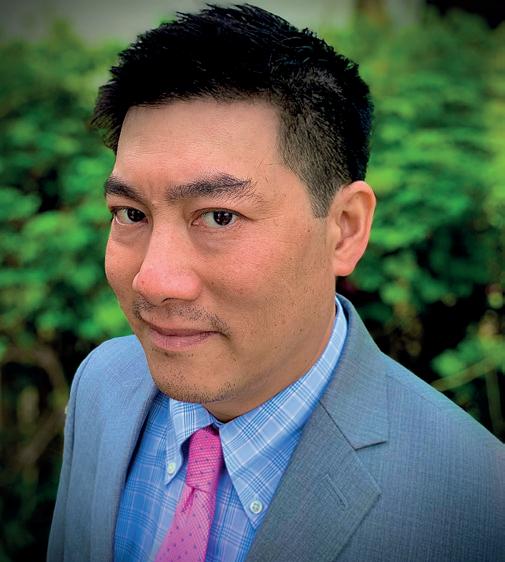
EDGAR CHEN
Kazakhstan ’97 Scarborough, ME
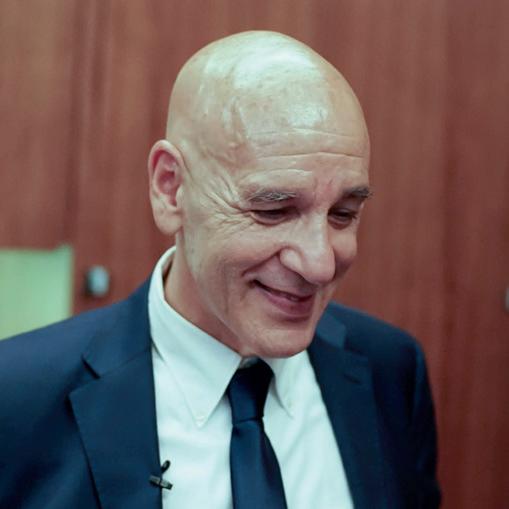
BILL BIKALES, Vice Chair Skillman, NJ

PATRICIA GRAUE
China '01 New York, NY
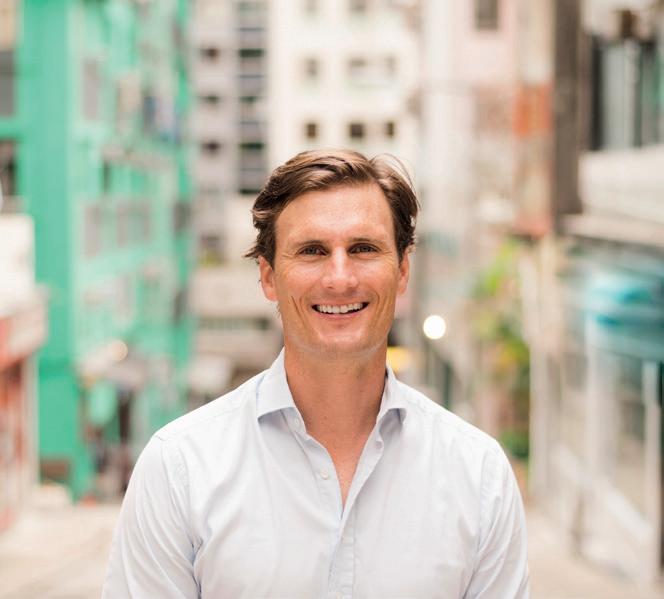

SOWA IMOISILI
Hong Kong SAR ’16 New York, NY
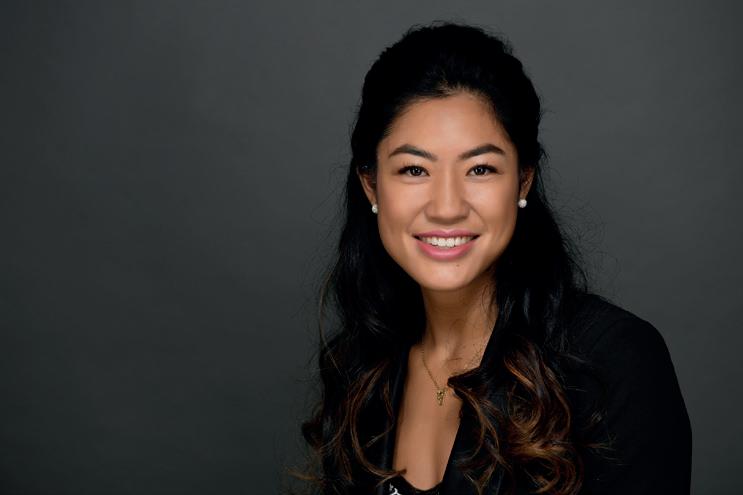
MARSHALL ROSLYN
China ’02
Singapore
JENNIFER (YEH) WANNENMACHER
Hong Kong SAR ’01
Hong Kong SAR, China
8
NEW HOST ORGANIZATIONS
Princeton in Asia is honored to have worked with over 400 host organizations across Asia in our history. In 2023, we initiated exciting fellowship opportunities with the following six new host organizations.

AND GLOBAL
Ulaanbaatar, Mongolia
Founded in 2017, AND Global is a cutting-edge fintech company that enables its clients to integrate financial technology solutions into their businesses and daily lives through proprietary Fintech-as-a-Service software.

GERHUB
Ulaanbaatar, Mongolia
GerHub is a non-profit social enterprise that works across the fields of architecture, design, urban planning, education, and engineering to develop efficient, low-cost products and services to the most pressing issues in the ger areas of Mongolia.
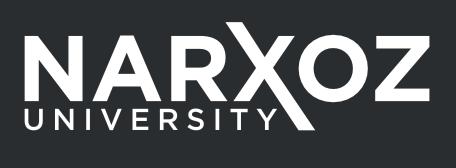
NARXOZ UNIVERSITY
Almaty, Kazakhstan
Narxoz University was established in 1963 and provides education in the fields of economics, business, finance, and law, and strives to implement international standards in all activities to foster students with a global mindset and skills.
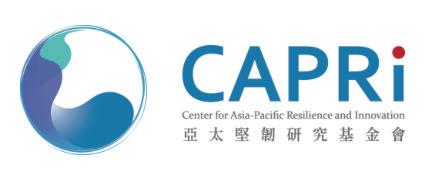
CAPRI
Taipei, Taiwan
The Center for Asia-Pacific Resilience and Innovation (CAPRI) was established as a nongovernmental and nonpartisan organization in 2022 to conduct interdisciplinary, comparative research on innovative practices in policy and governance that can strengthen societal resilience in the Asia Pacific.
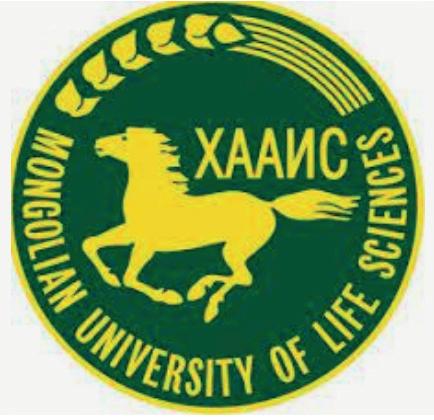
MULS
Ulaanbaatar, Mongolia
Founded in 1958, the Mongolian University of Life Sciences (MULS) seeks to modernize the nation’s agricultural sector by revamping traditional systems of production with technology and specialized training, and contributing to building an environmentally sustainable society.

TRACTUS ASIA
Osaka, Japan
Tractus Asia is a strategy consulting firm that provides market entry and expansion services for private companies as well as trade advisory for public sector clients, and is committed to helping multinational companies make strategic decisions regarding where to locate and how to structure direct investments worldwide.
9
MEET THE NEWEST MEMBERS OF THE PRINCETON IN ASIA TEAM!
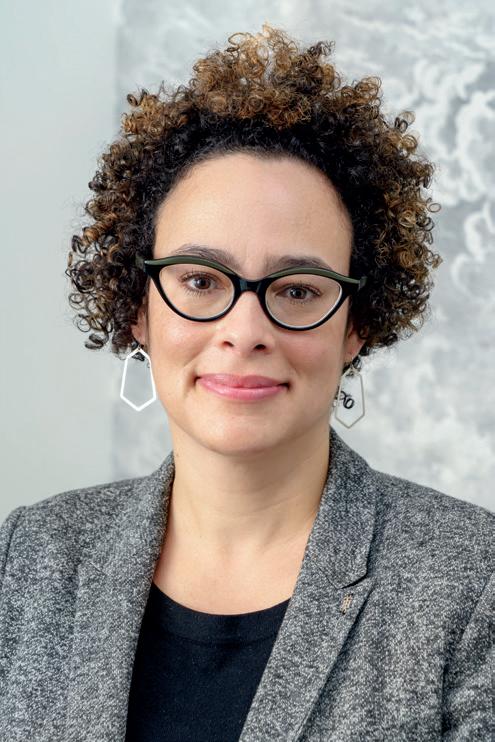
DANIELLE FLORES | Advancement Officer
Danielle (she/her) has served as PiA’s Advancement Officer since November 2022, and in this role she supports the organization's fundraising and stewardship efforts while managing communications and alumni engagement. Danielle holds a BA in History from the University of Florida and an MA in Museum Studies from the George Washington University. She has held various roles in fundraising, communications, and project management for organizations including the Princeton University Art Museum, the Dallas Museum of Art, the National Building Museum in Washington, DC, and the European Patients’ Forum in Brussels, Belgium.
MOLLY GIBLIN | Director of Programs
After completing undergraduate and master’s degrees at the University at Buffalo, Molly (she/her) began her career teaching English in Hong Kong. She then pursued a Ph.D. in History at Rutgers University, and spent several years teaching Global, European, and Asian history before moving into the field of international exchange. Molly joined PiA as Director of Programs in December 2022 and she is enthusiastic about the transformative potential of immersive global learning and is passionate about extending such experiences to a more diverse audience.

ABIE SANCAYA | Atlas Corps Fellow
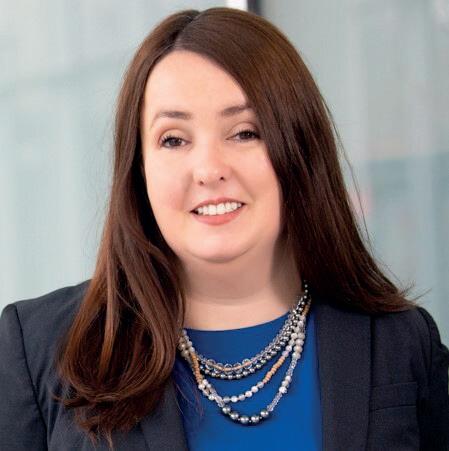
Abie is a rising humanitarian leader from Indonesia and began their work with PiA in June 2023 after serving as the Program Associate of the Counter-trafficking, Labor Migration, and Social Inclusion Unit at the International Organization for Migration (IOM). Abie holds a Bachelor of Law from Universitas Gadjah Mada in Indonesia and two Master's degrees, one in International Relations from the University of Groningen in The Netherlands, and the second in Theology from Uppsala University in Sweden. Through the support of the U.S. Embassy in Indonesia, Abie begins his Atlas Corps journey as an Atlas Corps Fellow with PiA working primarily with the Program Team.
SUELA THOMAS | Director of Advancement
Suela Thomas (she/her) joined PiA as Director of Advancement in August 2023. In this role, she leads efforts in fundraising and alumni engagement, channeling her passion for philanthropy and community building. Her prior development experience includes work with Stevens Institute of Technology, Pratt Institute, Columbia University Press, and the University of Arizona. Originally from Albania, Suela came to the United States to attend the University of Arizona, where she earned a BA in Journalism and a Master of Public Administration. She is currently pursuing an MBA at Stevens Institute of Technology with a focus on sustainability management.
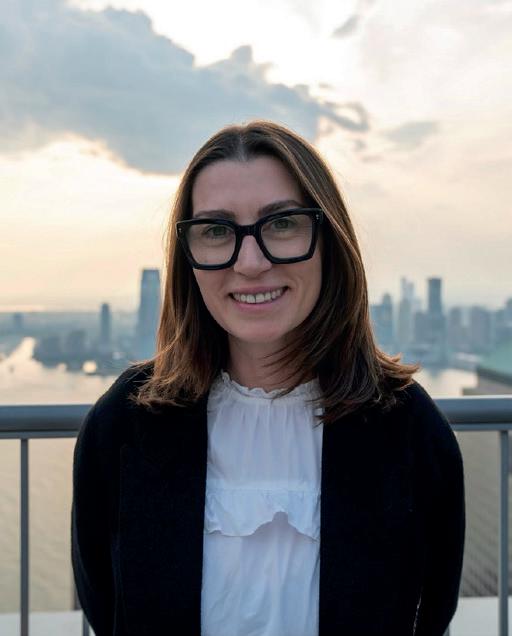
P i
10
A STAFF UPDATES
PiA AND ATLAS CORPS: A NEW PARTNERSHIP
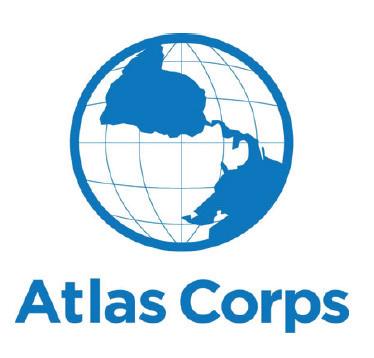
In partnership with the international nonprofit organization Atlas Corps, Princeton in Asia welcomed our inaugural Atlas Corps Fellow Abie Sancaya to the team in June 2023. Atlas Corps connects leading social change organizations with experienced professionals from around the world for yearlong fellowships designed to strengthen organizations, develop global leaders, and foster innovation. In this role, Abie will collaborate closely with the PiA Program Team to conduct comprehensive evaluations and cultivate relationships with potential host organizations in Southeast Asia, with a focus on opportunities in his home country of Indonesia. Princeton in Asia gratefully acknowledges Tom Tuttle (Indonesia ‘88) and Mila Tuttle for their generous support of Abie Sancaya's Atlas Corps Fellowship.
We are pleased to share the following reflections from Abie on his PiA experience and living and working in Princeton, New Jersey.
NAVIGATING NEW HORIZONS : From Indonesia to Princeton in Asia
by Abie Sancaya
Embarking on this journey as an Atlas Corps Fellow with Princeton in Asia has genuinely been a thrilling voyage of growth and self-discovery. Prior to departing from Indonesia, I faced numerous inquiries regarding my choice to leave my job for a fellowship, even though I was confident about this decision. As it turns out, my conviction was well-founded, as this fellowship has proven enriching. It has provided me with more than just professional growth; it has improved me personally. My communication skills have sharpened, my resilience has deepened, and most importantly, I've had the opportunity to experience the world in new ways.
So far, I have been given the opportunity to bring into service my regional expertise in Southeast Asia, particularly Indonesia, in reaching out to potential partners, Additionally, I have been utilizing my background in working with marginalized communities to support PiA's commitment to Diversity, Equity, and Inclusion (DEI) work, which has been engaging, aligning seamlessly with my long-standing curiosity. Lastly, I've also been immersing myself in the inner workings of American organizations, gaining insights into day-to-day operations and bureaucratic processes. These experiences have broadened my organizational management skills and given me a fresh perspective. Beyond these professional endeavors, the small yet remarkably efficient PiA team has left a lasting impression on me. Their willingness to extend help despite their busy schedules has been inspiring. Witnessing PiA's approach reminds me that creating a meaningful impact doesn't necessarily require a multitude of people; it's about the quality of effort and dedication, which has inspired me to work more on my recently established and small-crewed non-profit, BRANI, in Indonesia.
On a more personal note, transitioning from the dynamic atmosphere of Jakarta, Indonesia, to the tranquility of Princeton hasn't been without its challenges. The vibrant energy, mixed cultures, and constant activity in Jakarta created an exhilarating yet demanding environment that I had become accustomed to. The fast-paced rhythm of life there was my norm. Now, in Princeton,
L-R
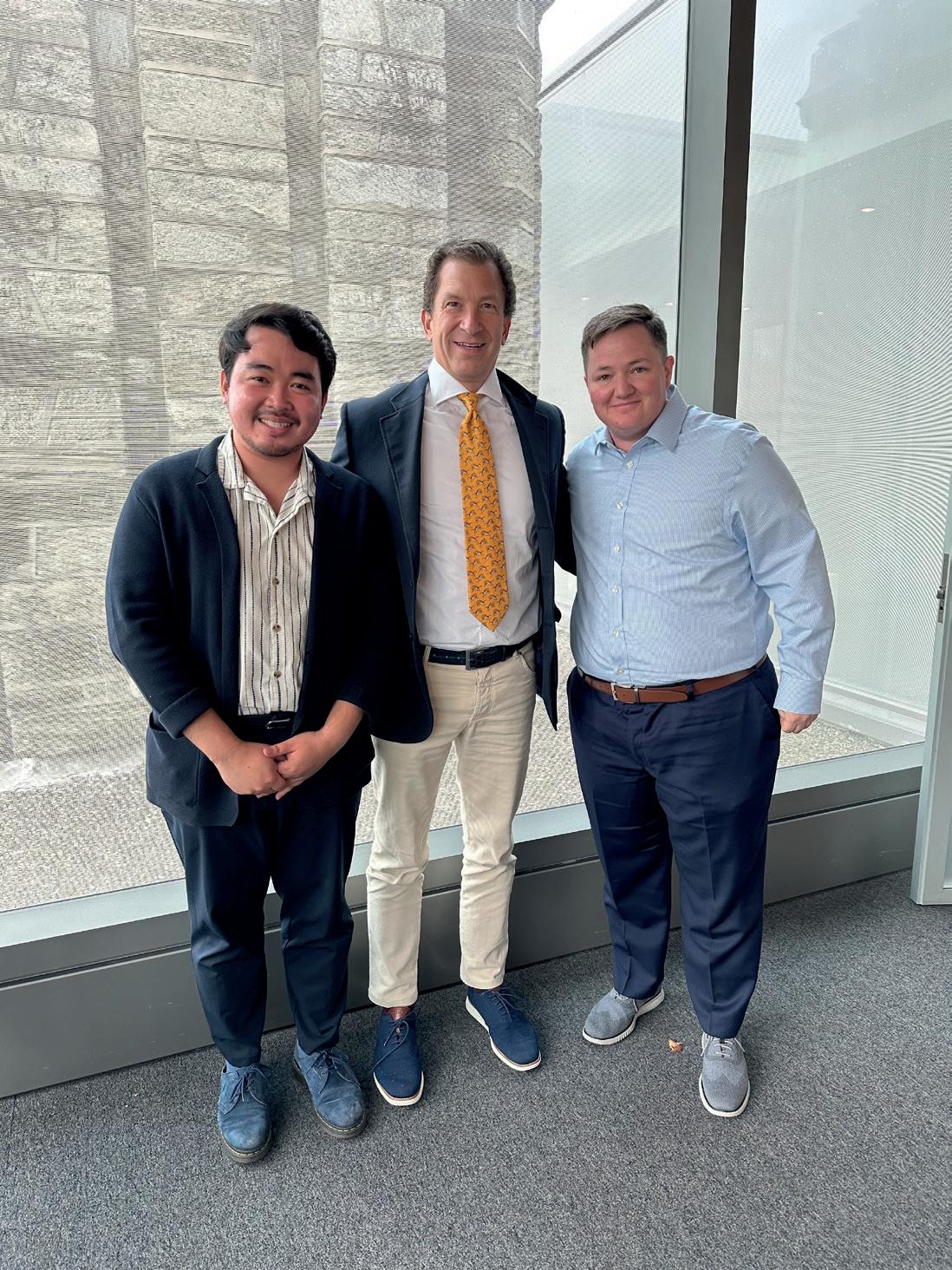
life moves at a more serene pace. The quiet streets, neat landscapes, and close-knit community here are a world apart from Jakarta's busy energy. Adjusting to this calmer pace, making new friends, and understanding the smaller-town nuances have had their challenges. Yet, embracing Princeton's charm has shown me how every place contributes its own special element to life's tapestry.
11
Atlas Corps Fellow Abie Sancaya, Tom Tuttle Indonesia ‘88, and Executive Director Mags Dillon Laos ‘10-’12.
ATLAS CORPS FELLOW
FEATURE: P i A ALUMNI AND EDUCATION
PiA ALUMNI AND A LEGACY OF LEARNING
by Julianne Greco | Indonesia ‘12
A wave of anti-U.S. protests rocked China in the spring of 1999 when U.S.-led NATO forces accidentally bombed the Chinese embassy in Belgrade, killing three Chinese journalists and injuring at least 20.
Hilary Smith (China ’98) vividly remembers a demonstration unfolding right outside the foreign guesthouse, the residence for international teachers at the Dalian University of Technology during her PiA English teaching fellowship. As she peered out from her window, she was startled to spot her own students front and center at the protest. “When they see me, they break into these huge smiles and are waving at me,” the 47-year-old recalls, describing the bittersweet mix of emotions that struck her as both “terrible and wonderful.”
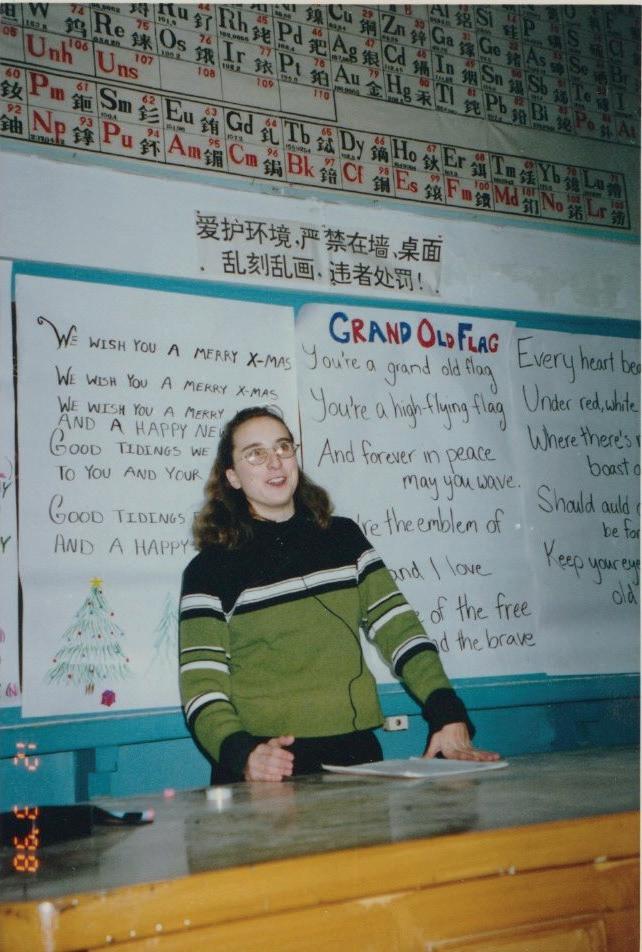
The Denver native found this nothing short of perspective-shifting. “It was both a moment where I saw how my country was perceived abroad but also that those personal connections that I had made were more important” and in a way, more powerful, Smith reflects.
Now a professor of History at the University of Denver focusing on Chinese History and the History of Science and Medicine, Smith draws inspiration from her formative PiA experience and
often brings stories from PiA into her classes to offer a glimpse of China in the ’90s. But perhaps the most profound lesson that she continues to carry forward as an educator today is “how important it is to keep those human connections,” along with the necessity of preserving a humanizing aspect while teaching about China.
The value of fostering cross-cultural connections is something Smith thinks about a lot, a concept that holds immense relevance with relations unraveling between China and the U.S. in recent years. These challenges manifest in her classroom through dwindling numbers of international students from China and a prevalent influx of students with more rigid and dehumanized perceptions of China and its culture.
In an effort to bridge these divides, Smith is headed to Taiwan for six months in January under a Fulbright U.S. Scholar grant. Her focus is a book project challenging prevailing assumptions within modern nutrition science. This field typically upholds European and American diets and bodies as the global norm, often framing Chinese dietary practices as somehow deficient. By delving into Chinese perspectives on food and health, Smith seeks to dismantle these embedded prejudices entrenched in nutrition science.
In 1898, a hundred years before Smith set off to her Dalian post for the 1998-1999 school year, Robert “Pop” Gailey embarked on an overseas voyage taking the same path that Smith later would, from Princeton to China, laying the foundation for what we now know as PiA.
Carrying $500 in donations from the Princeton undergraduate class, Gailey set sail on a steamer to support the recently established YMCA in Tientsin (now Tianjin), marking the birth of an institution that has since evolved into a diverse program that extends far beyond its initial Chinese roots.
“Since its founding, Princeton in Asia has advanced an educational mission of promoting mutual appreciation, respect, and exchange between and among cultures across the United States, Asia, and beyond,” says PiA Executive Director Mags Dillon (Laos ’10-’12).
Following those early beginnings, PiA has expanded its reach and embraced diverse initiatives across Asia, adding more countries into the mix, as well as fellowships in the fields of international development, public health, environmental advocacy, journalism & media, engineering & technology, and business.
“Whether teaching as our very first PiAers did or contributing to learning and exchange within nonprofit, business, media, and multilateral organizations across sectors, our Fellows and Interns carry forward a 125-year tradition of teaching and learning across difference,” says Dillon.
Education has always been at the heart of the PiA mission and alumni like Smith who have pursued careers in academia stand as a testament to the powerful ripple effect of the PiA experience.
12
Hilary Smith
These educators bring PiA's vision to life, infusing their classrooms and professional works with the values of fostering stronger cross-cultural connections and humanizing other cultures.
Take Thomas Talhelm (China ’07) for instance. One of the most remarkable things he noticed as a budding cultural psychologist during his PiA fellowship teaching English in Guangzhou and traveling around visiting other Fellows was the regional differences within the country. These observations would later form the basis of the Rice Theory.
“I argue that Southern China is more collectivistic because it’s farmed rice for thousands of years and the North has farmed wheat,” says the 38-year-old, explaining that the demands of traditional rice farming and irrigation make rice-cultivating cultures more interdependent. Now a professor of Behavioral Science at the University of Chicago Booth School of Business, Talhelm believes that the Rice Theory is largely to thank for landing him his current job.
In this cultural immersion of teaching in Guangzhou, Talhelm also found an unexpected depth of connection with his students. He shared, “One of the things that shocked me about teaching in China was how much students opened up to me. I’d have students come to me and tell me about crippling anxiety,” he remembers.
“It was super personal and revealing and not what I expected from a culture that’s known for being shy or modest,” he added, attributing this to the foreign teachers being a “dead end” or a rare safe space where students could open up without fear of things going back to their parents or other teachers.
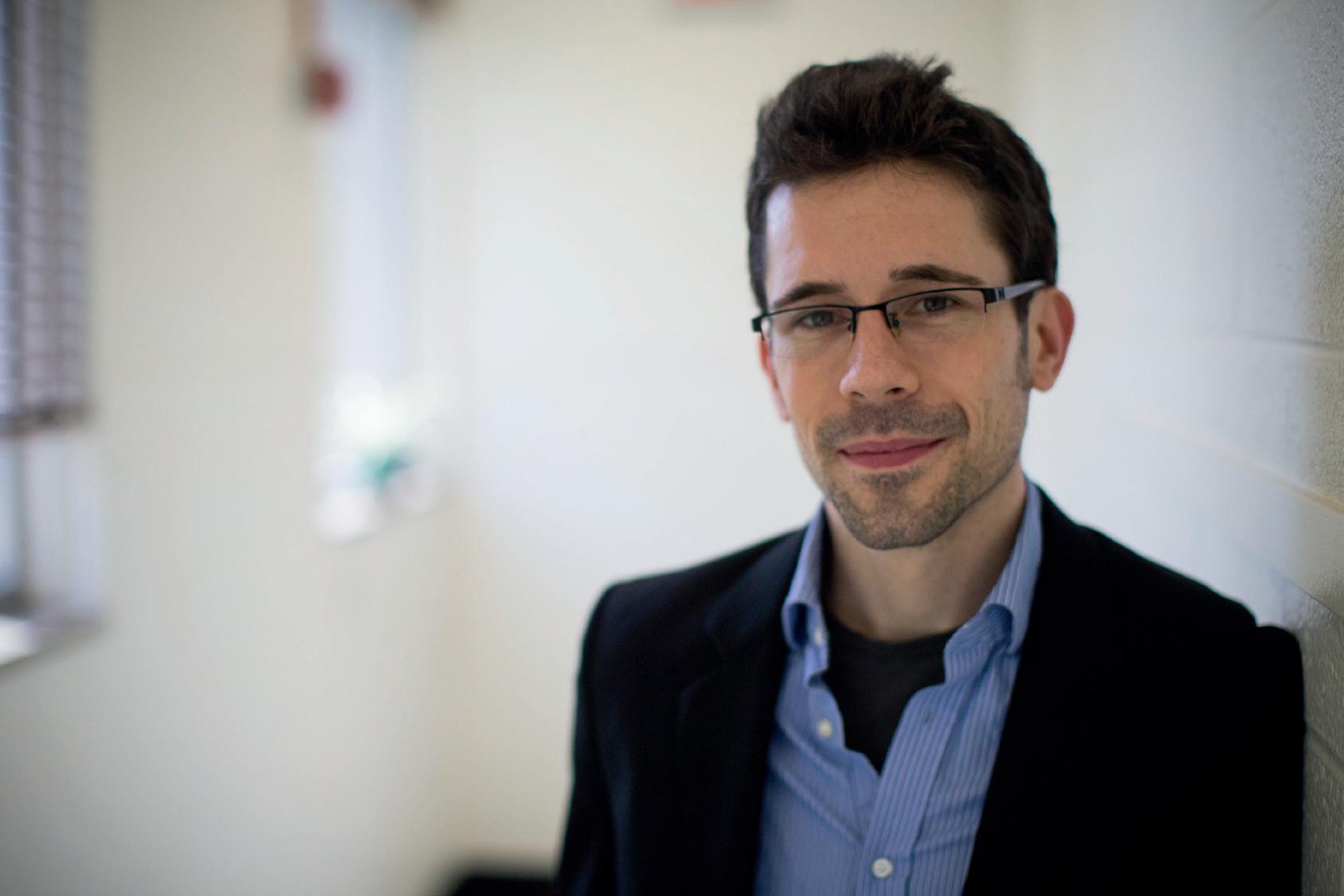

For Peter White (Mongolia ’07), another PiAer who pursued a career in academia, teaching at the University of the Humanities in Ulaanbaatar ignited a love for education. The 39-year-old recalls that his PiA classes weren’t solely about imparting knowledge but about sharing enthusiasm with students. “I often draw on experiences from my time in Mongolia to help my students understand a specific concept or the experience of people in other parts of the world than their own,” he says.
Weekends were dedicated to venturing into the countryside for horse riding, fermented mare's milk, hiking, encounters with a shaman, dog-sledding, visits to Buddhist sites, and even driving a tank. Beyond these adventures, his Ulaanbaatar post allowed him to immerse himself in the city's life.
“I think there’s real value in living and working in another society and being part of its rhythms and routines. That’s something that you can’t do as a tourist.”
Now a professor of Political Science at Auburn University, White's passion and global perspective greatly enrich his teaching, evident in his recognition as Auburn’s 2022-2023 Honors College Professor of the Year.
Amy Kohout (Laos ’05), a History professor at Colorado College, often looks back to her time with PiA where she found learning Lao to be both humbling and immensely rewarding. “Remembering what learning can feel like, especially when we are stepping a little or a lot outside our comfort zones is an important part of supporting my students to do work they are proud of,” Kohout emphasizes, drawing from her own journey.
FEATURE: P i A ALUMNI AND EDUCATION
Thomas Talhelm
13
Peter White

This year, the 41-year-old is teaching courses spanning the history of the U.S. West, the Civil War and Reconstruction, and U.S. environmental history. But Kohout firmly believes that her current work wouldn’t be possible without her time at the International Union for Conservation of Nature (IUCN) in Vientiane where she focused on environmental issues. “I learned a lot about what international environmental development work was like in practice, which helped me reflect on my own goals and pathway,” explains Kohout.
“I think some of the things I study have seeds that might have begun sprouting as I rode my bicycle to work each day in Vientiane, or exercised with my fantastic boss around Patuxai, or enjoyed Beerlao at the Sunset Bar with my roommates.”
PiA also significantly shaped the professional trajectory of Tarryn Li-Min Chun (Taiwan ’06-’07), now an assistant professor in the Department of Film, Television, and Theatre at the University of Notre Dame. The 39-year-old credits her two-year fellowship at the Affiliated School of Tunghai University for solidifying her decision to pursue graduate school. Her experience with PiA, along with language studies in Taiwan, notably strengthened her MA and later Ph.D. applications. Additionally, her evenings auditing Chinese literature classes at Tunghai enriched her field-specific background and provided insights into how the subject is taught in Taiwan universities.
While her Ph.D. is in modern Chinese literature, Chun’s main research centers on modern and contemporary Chinese theater. Originally considering a career in theater as a stage manager, she's delighted to have found herself teaching in a theater program, where her courses are mostly about East Asian theater and visual culture.
The course closest to Chun's research, titled "Politics and Performance in Modern China," explores theater's role in political change and the theatrics of politics in 20th-century China. In recognition of her expertise, she won a 2021 National Endowment for the Humanities Fellowship for her ongoing project, "Spectacle and Excess in Global Chinese Performance."
She shares Smith’s concerns about the current challenges in U.S.-China relations. However, like the Denver professor, along with Talhelm, White, and Kohout, she carries on building bridges through her work. Chun has just been selected to join the eighth cohort of the National Committee on U.S.-China Relations Public Intellectuals Program where she will be doing just that. “I believe very strongly that arts outreach can help to bridge some of those seeming divides - even if it won’t necessarily solve any acute political problems!”
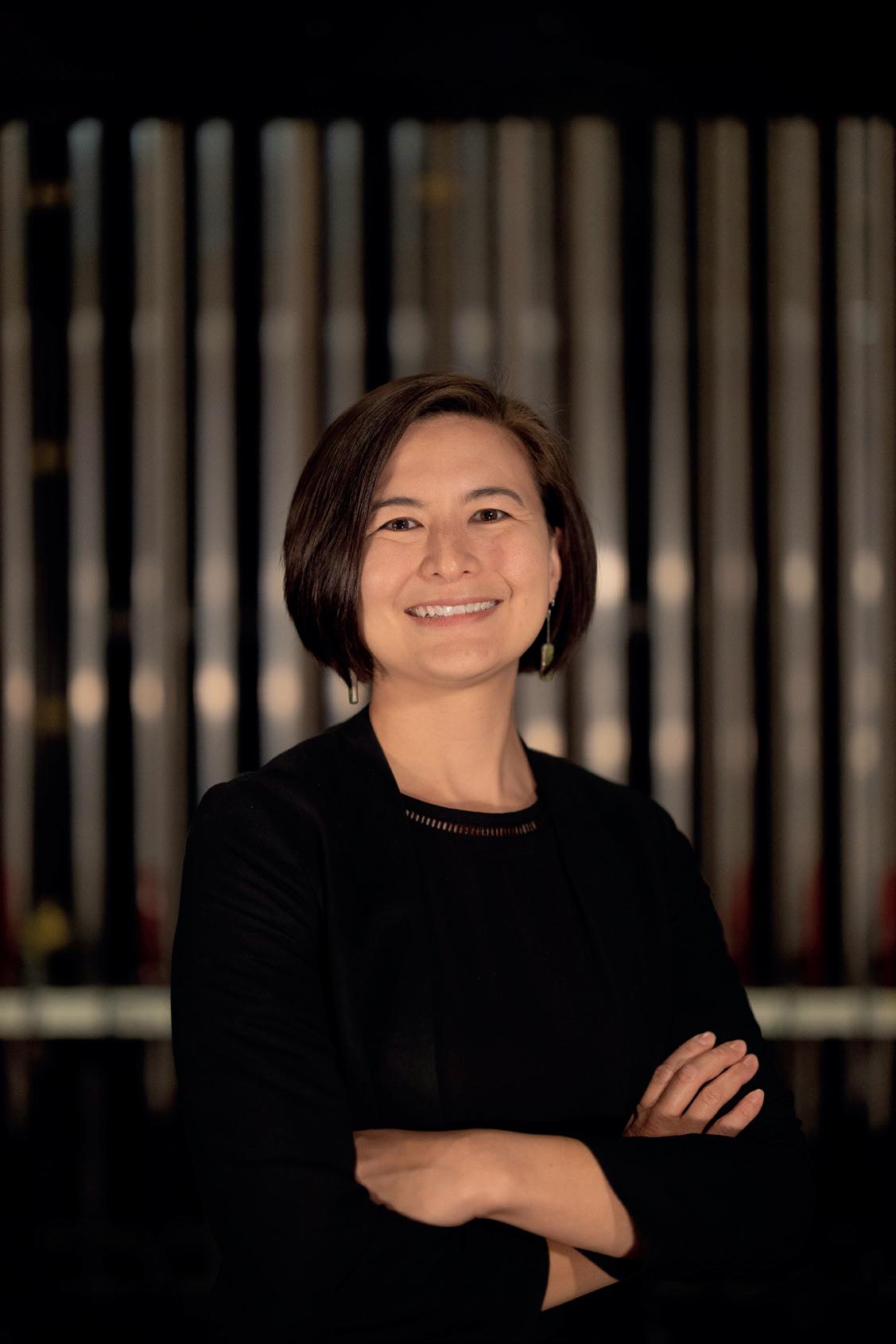
“We’re proud of our Alumni for carrying forward PiA’s 125-year legacy of building bridges between the US and Asia,” Dillon reflected, “and for the roles they play in fostering mutual appreciation and intercultural understanding – in the classroom, in the boardroom, or in the context of their interpersonal relationships.”
FEATURE: P i A ALUMNI AND EDUCATION
Amy Kohout making khao soi (curry noodle soup) with her work colleagues.
14
Tarryn Li-Min Chun
WHAT’S IN A NAME?
by Ana Olson | Thailand ‘15
et’s admit something: it can be tricky to explain the “Princeton” part of Princeton in Asia. Officially, PiA is its own independent non-profit organization, affiliated with and located on campus at Princeton University. But up close, the borders can be more porous – and of course, there’s the name. In the course of its 125 years, PiA has grown from an ad-hoc charitable organization founded by Princeton students to an established institution with a history of impactful work in over 33 countries, all while negotiating a close relationship with one of the world’s top universities. And so, in honor of the 125th year anniversary, it’s worth clarifying the connection between PiA and Princeton. What exactly is their shared history? And what might their future together look like?
PiA’s Executive Director Mags Dillon (PU ‘06, Laos ‘10-’12) is quick to celebrate the significant contribution the university has made: “In PiA’s 125 year history, over 1800 Princetonians have contributed to PiA’s mission of promoting mutual appreciation and cross-cultural understanding, while also working in service of Princeton University’s unofficial motto – in the nation’s service and in the service of humanity.” He also notes the benefit PiA has offered in turn: “For the 1600 Alumni who came to the fellowship from universities across the globe, and for the 400 host organizations across 33 countries in Asia, PiA serves as a bridge to Princeton and its thriving global community.”
While the PiA of today looks very different from its earliest predecessors, it maintains a special relationship to Princeton and its students. “We are proud to call the Louis A. Simpson International Building home,” Dillon says, “energized by our collaborations with faculty, programs, centers, and departments across campus, and grateful for the University’s continued support of our mission and work.” The two organizations are natural partners because of their shared missions of service, which both have an origin in the civic spirit of Princeton students.
CROSS-CULTURAL UNDERSTANDING
Reflecting on six months in Tianjin in his December 1898 report to the International Young Men’s Christian Association, Robert R. “Pop” Gailey noted that “the beginning of what one feels to be his life work cannot be but full of significance.” He’d been elected by the Princeton University YMCA affinity group to deliver over $500 in donations to Tianjin’s fledgling YMCA branch, founded just a few years earlier. He found the work so meaningful, he stayed and invited others to join him. This marked the beginning of a new era for Princetonians interested in living and working in China. Some who came to Tianjin, including Gailey, would go on to establish a new YMCA in Peking, initiating the Princeton-in-Peking program.
Over the next several decades, the organization - which was always separately funded and operated - would grow and transform organically. Princeton graduates continued to arrive in China, first at the Peking YMCA and then at the new University in Yenching. Accordingly, the name changed to the Princeton-Yenching Foundation. In the 1940s and 50s, responding to China’s changing political climate, the program broadened its horizons to locations in Taiwan and Hong Kong. By 1955, the expansion pushed the organization to choose a more flexible and capacious name: Princeton in Asia, or PiA for short. Further changes came in the 1970s when the program expanded both its acceptance criteria, allowing non-Princeton graduates to apply, and its regional breadth, with postings in the westernmost parts of Asia including Turkey, Kuwait, and Yemen. The transformation from Princeton-in-Peking to the Princeton-Yenching Foundation to Princeton in Asia marked the ever-expanding focus of the program while also highlighting its stable core: the sustained interest of Princeton students in pursuing meaningful work and service in Asia.
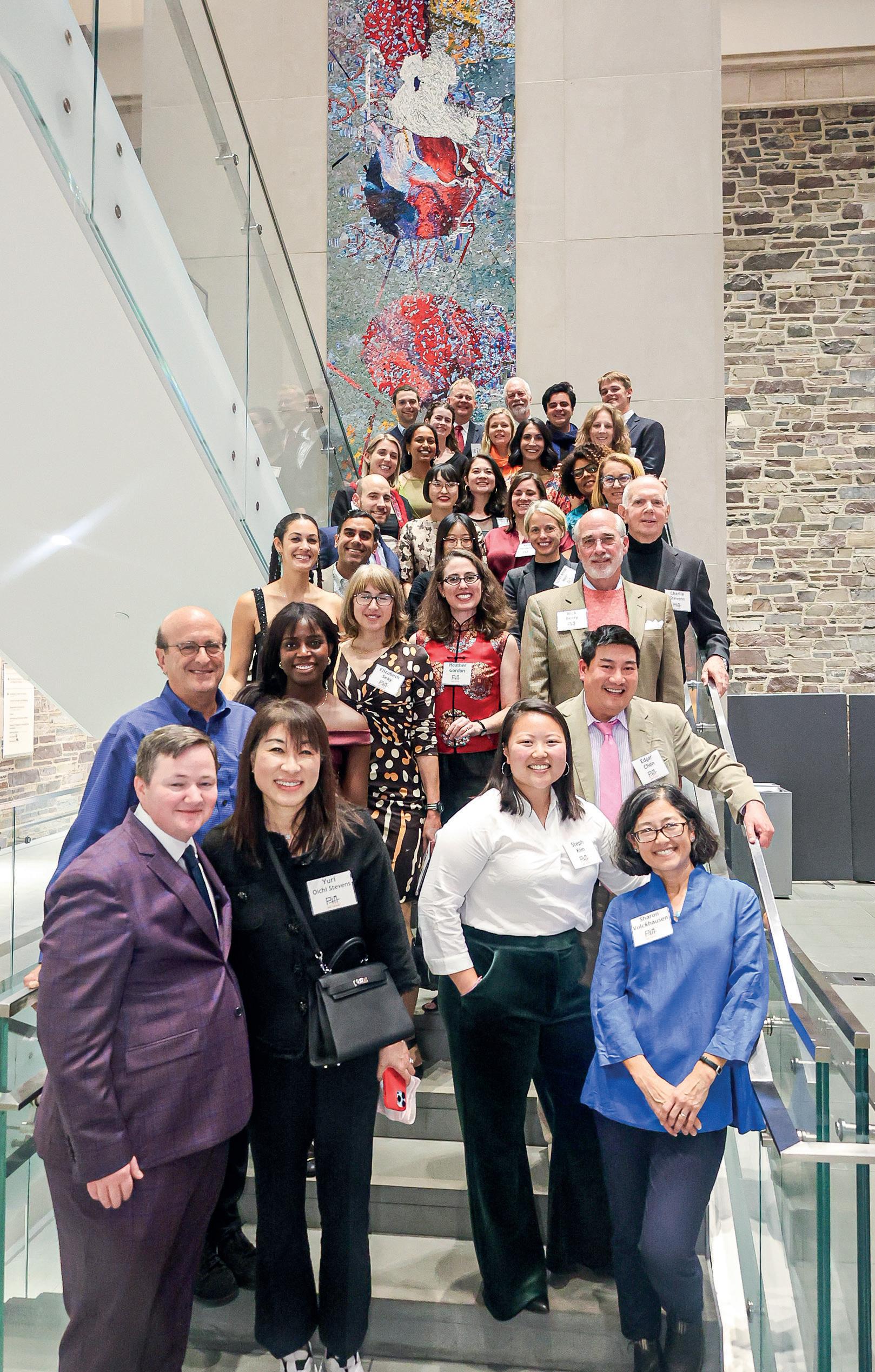
L P i A AND PRINCETON UNIVERSITY
15
PiA Alumni from the past seven decades in the Louis A. Simpson International Building, located on the Princeton campus.
MUTUAL APPRECIATION
Today, PiA and Princeton University enjoy a mutually beneficial working relationship. PiA partners with and receives support, including some funding, from many departments and programs at the University, including the International Internship Program, the Pace Center for Civic Engagement, the Program in East Asian Studies, the Departments of East Asian Studies and Near Eastern Studies, the Labouisse Fellowship, and the Office of International Programs. Peer organizations Princeton in Africa and Princeton in Latin America were inspired by the tradition of PiA, and the three continue to share knowledge and expertise.
For its part, Princeton University’s institutional heft has offered PiA continuity and stability through its many transformations. Professor Thomas Conlan, head of the Program in East Asian Studies, suspects Princeton’s support of PiA has “helped it to survive and thrive… in a different world and evolve in new ways,” adding that he “could imagine a lot of comparable organizations would not have survived so long.” 125 years is an impressive amount of time–older, he notes with a laugh, than many states. The University also provides PiA with office space, allowing for the kind of casual collaboration and exchange of expertise that can only come with physical proximity. Additionally, PiA has benefited greatly over the decades from the dedicated service of distinguished university faculty and administrators on its governing Board of Trustees. Professor Anna Shields, the Gordon Wu ‘58 Professor of Chinese Studies and Chair of the East Asian Studies Department, currently serves on PiA’s board.
PiA’s organizational independence, on the other hand, affords innovation, creativity, and a certain amount of risk-taking. Both Conlan and Aly Kassam-Remtulla, Vice Provost for International Affairs and Operations, repeated admiration for the geographic breadth of PiA’s offerings. Over the years, PiA has offered fellowships in countries where Princeton University didn’t offer study abroad or language programming prior to PiA’s arrival, and in many countries where it doesn’t to this day. Even as many University programs now exist to take students to China or Japan, far fewer can offer in-depth experiences in Mongolia, say, or Vietnam. “Myanmar, Malaysia, Laos… those are places where I think Princeton students have not necessarily been before, [and] we don’t have a lot of existing programs,” said Kassam-Remtulla. In taking Princeton students and graduates to places they might not have otherwise considered, PiA expands Princeton’s alumni network abroad. PiA alumni have served as heads of University alumni clubs and local Princeton affinity groups across the globe
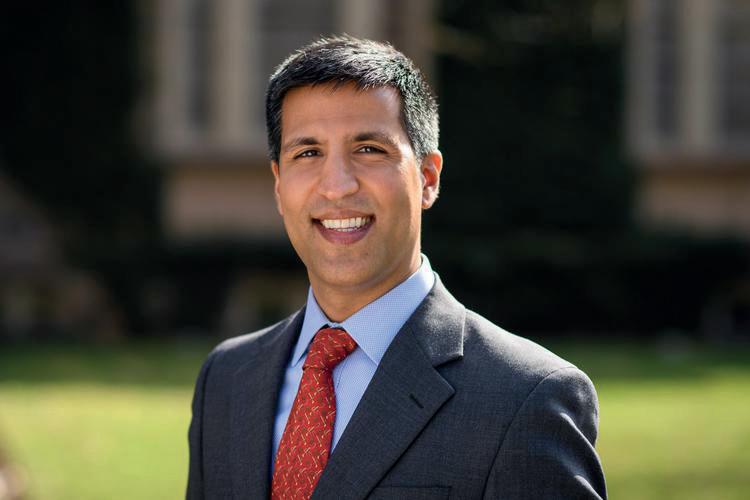
Small but mighty, PiA’s size gives it institutional agility and a unique internal culture that has an impact far beyond the reaches of the program. Kassam-Remtulla notes, for example, that PiA has been a leader in its approach to diversity and equity, saying “their clarity of vision around that has been influential to those of us at the University.” Alumni of the program have also returned to Princeton to teach – such as Associate Professor of Political Science Rory Truex (PU ‘07, China ‘05 and ‘06) – or to serve on boards and in University leadership including, in the case of Kassam-Remtulla’s predecessor Anastasia Vrachnos, (PU ‘91, Indonesia ‘91, former Executive Director) as Vice Provost for International Affairs.
The primary point of overlap between PiA and the University is of course the students themselves. The percentage of Princeton students who participate in PiA’s fellowship program has declined over time, though Kassam-Remtulla notes the issue is not unique to PiA. Princeton students, much like their peers at other elite institutions, often weigh a variety of attractive opportunities after graduation, including competitive starting salaries in tech. Still, PiA and Princeton’s special relationship also has its perks for Princeton undergrads, who are exclusively eligible to participate in the Summer Internship. The Internship, which offers a condensed short-term immersive work experience, has been a huge success, with over 340 Princeton students participating since its creation. 45 of those students have completed both an internship and a subsequent fellowship, suggesting the internship is a meaningful onramp to continued engagement in Asia. While the program paused during the pandemic, it relaunched in 2023 with postings in Japan and Kazakhstan.
IN THE SERVICE OF HUMANITY
Through trials and transformations, pandemics and political shifts, the relationship between the University and PiA has remained close, warm, and supportive. It needs to, as their shared mission becomes ever more crucial. Kassam-Remtulla and I happened to speak on the morning of diplomatic talks between Xi Jinping and President Biden. Against the backdrop of such high-stakes political negotiation, PiA’s work seemed all the more significant to him. “It’s critical that we maintain those apolitical links to other countries,” he told me. “There will always be geopolitical issues and challenges, and I think one of the things that’s really special about Princeton in Asia… is that they sort of fly below the radar and create opportunities for people to be engaged at a person to person level.”
It was the enduring interest of Princeton students to engage at that person to person level that created an organization successful
enough to expand so far beyond its own early vision. PiA and its spiritual predecessors, Princeton-in-Peking and the Princeton-Yenching Foundation, are the natural outgrowth of Princeton University’s civic spirit. “We feel very positively about Princeton in Asia and the impact it’s had in advancing our mission of institutional service,” reflected Kassam-Remtulla. “I see Princeton in Asia as very much a part of the mission of the University. It’s one of the ways in which we can make that tangible, make that real – that opportunity for people to work and serve and engage in a global context.”
The 125th anniversary of PiA thus celebrates, in one sense, the wishes of more than 1800 Princetonians to connect meaningfully with the many cultures and communities of Asia – an endeavor PiA will continue to facilitate, one hopes, for at least 125 years more.
P i A AND
16
Aly Kassam-Remtulla, Vice Provost for International Affairs and Operations, Princeton University.
PRINCETON UNIVERSITY
CELEBRATING OUR PHILANTHROPIC CHAMPIONS
YALIE FOR P i A:
MAJOR GIFT TO THE LAST CAMPAIGN SETS THE COURSE FOR THE NEXT CHAPTER OF PIA
by Michele Hickey
To suggest that the Princeton in Asia experience was transformative for Tim Steinert (Taiwan ’83) would be quite an understatement. “It’s hard to say when a turn in life determines everything else, but so many things in my life came about because of PiA,” he says.
Tim’s initial interest in China was sparked by an undergraduate course in modern Chinese history led by the legendary teacher and writer Jonathan Spence. It resurfaced as he neared graduation – around the time that the U.S. changed its diplomatic recognition to the PRC from the ROC. “American normalization with the PRC dominated the news,” he explains, adding that he first applied to Yale-China, that university’s Chinese-American cultural exchange initiative.
As fate would have it, Tim was not selected for the Yale-based program. He applied to PiA, but was disappointed to learn that the only post available to him initially was at Yogyakarta in Indonesia, far from China. As he mulled over this opportunity, fate again stepped in. “It was midsummer when a spot in Taiwan opened up,” he says. “It took me about one day to take the offer!”
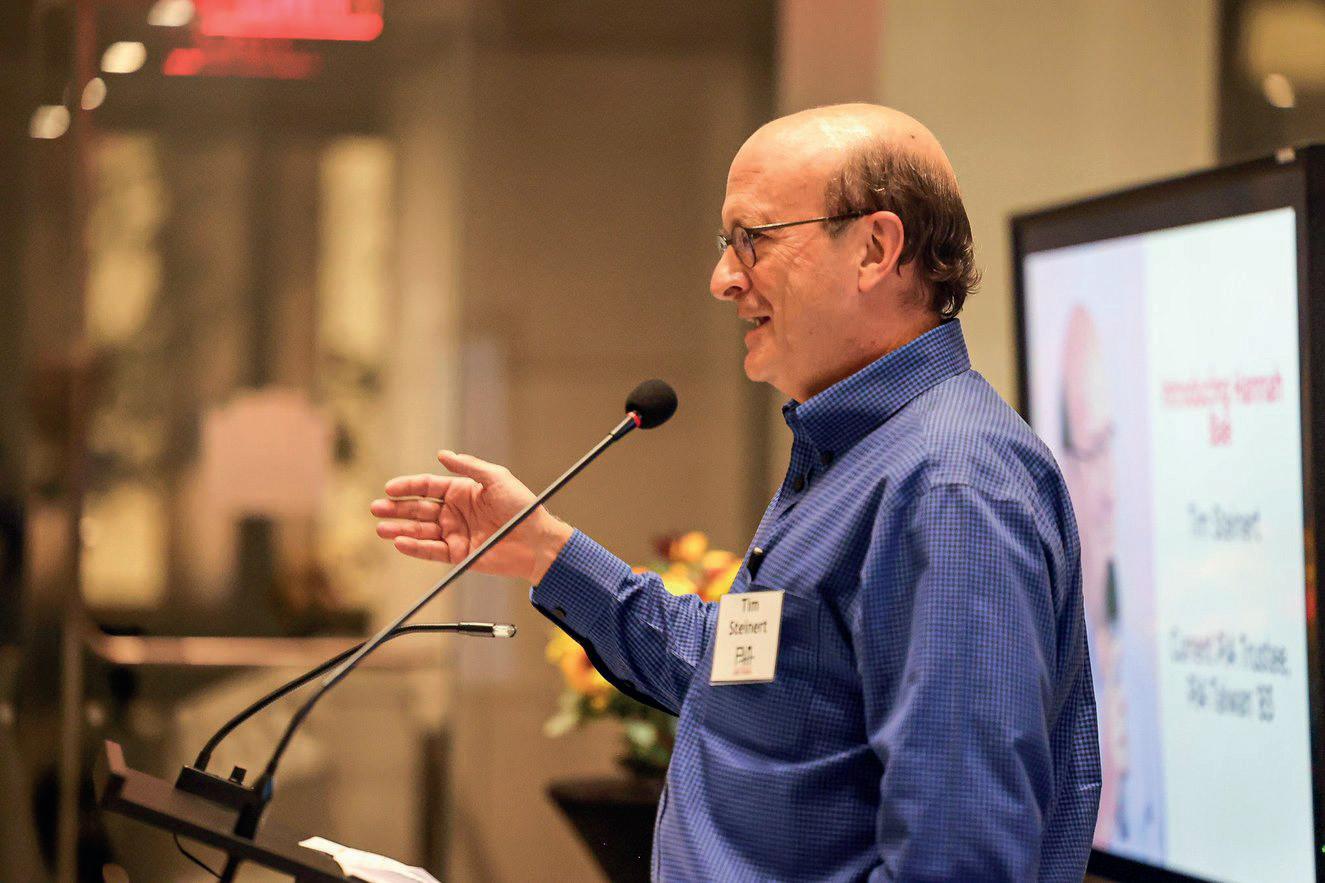
Within weeks he landed at what was then called Chiang Kai-Shek International Airport (now called Taiwan Taoyuan International Airport) to meet with the head of the English department at Chinese Culture University, where he would teach English to undergraduate students. “The classes were large, sometimes with as many as 50 or 60 students,” Tim recalls. “I had to come up with ways to make the classes engaging.” To help students with the pronunciation of the “TH” sound, he had them say words like “this” and “that” while holding their tongues with their fingers.
Tim decided to stay in Taipei after his post ended, taking a job as a copywriter for Taiwan’s United Daily News, and traveling whenever possible. “I worked as a tutor for extra money,” he says. “My clients included the senior manager of a local computer component company and the special secretary to the then Vice-President of Taiwan, Lee Teng-hui.” Lessons included reading and discussing articles from the English newspapers. “We had great conversations on many headline issues in Taiwan business and politics, as well as U.S.-Taiwan relations,” he says.
On a trip through Hong Kong, Tim met PiA alumnus Owen Nee (Hong Kong SAR ’65), now deceased, who shared his experiences as an international lawyer in China. That led to a summer job with Coudert Brothers, Nee’s firm, and a new perspective on Tim’s own plans to attend law school. “I studied history in college and had done internships in Washington, D.C.,” Tim says. “I had an interest in politics and always thought law could be a step on that road. After PiA and my time in China, I chose Columbia for its Chinese legal studies program.”
Fresh out of law school, Tim joined Coudert, landing in Beijing just months after the 1989 Tiananmen Square massacre. “The city was very quiet,” he says. During his four years in Beijing, he met a Beijing native who would later become his wife.
After a brief return to the U.S., Tim relocated to Hong Kong to work with Davis Polk & Wardwell and later Freshfields Bruckhaus Deringer, where he specialized in securities and cross-border mergers and acquisitions. During that time, he married his Beijing sweetheart and started a family. In 2007, Tim joined Alibaba Group as General Counsel and Secretary, and in 2014, he helped lead the company’s U.S. IPO, which, at the time, was the largest IPO in U.S. history. Tim retired from Alibaba in 2020 and currently serves as an Honorary Advisor to the company.
During the time since he joined the Board of Trustees of PiA in 2018, Tim has been a philanthropic champion, helping PiA double its endowment with a portion of his major gift in 2018. Tim has also led vital governance changes that place the needs of Fellows at the forefront and increase organizational effectiveness.
“Our governance and financial improvements are crucial to PiA fulfilling its mission,” Tim says. “There are many kids coming out of college who don’t have the means to pursue a job in Asia. They need guidance to be able to identify viable opportunities, and financial support to make such a venture logistically possible.”
Tim’s life was forever altered by PiA, and his desire to give back to the organization that gave him so much drives his current involvement and support. But it could also be said that his contributions – to business, to PiA, and to the concept of building greater cultural understanding – are transformative on a larger scale, with the potential to change the lives of future PiA Fellows and to continue the important work of building bridges across country borders.
“PiA is an experienced organization that is in a position to facilitate impactful exchanges between the U.S. and China,” Tim concludes. “I believe these kinds of people-to-people exchanges can not only change individual lives but also contribute in some small way to reducing tensions and improving relations between our countries.”
Tim Steinert
17
CELEBRATING OUR PHILANTHROPIC CHAMPIONS
A FAMILY LEGACY:
$ 1 . 2 MILLION PLEDGE TO THE PRINCETON IN ASIA CAMPAIGN
by Michele Hickey
It isn’t often that one individual is able to honor, and continue, two family legacies. Yet Sharon Lyu Volckhausen (Korea ’91) has accomplished exactly that.
Sharon followed in the footsteps of her father by becoming a Princeton in Asia (PiA) Fellow, adding a new generation to a long-held family tradition. By choosing Korea as her fellowship destination, she also reconnected with her mother’s homeland. “I wanted to do something interesting before starting law school,” says Sharon, who is now Judicial Assistant to Hon. Denny Chin, U.S. Court of Appeals for the Second Circuit. “I knew about PiA through my dad, and because of my mom’s family heritage, I was interested in Korea.”
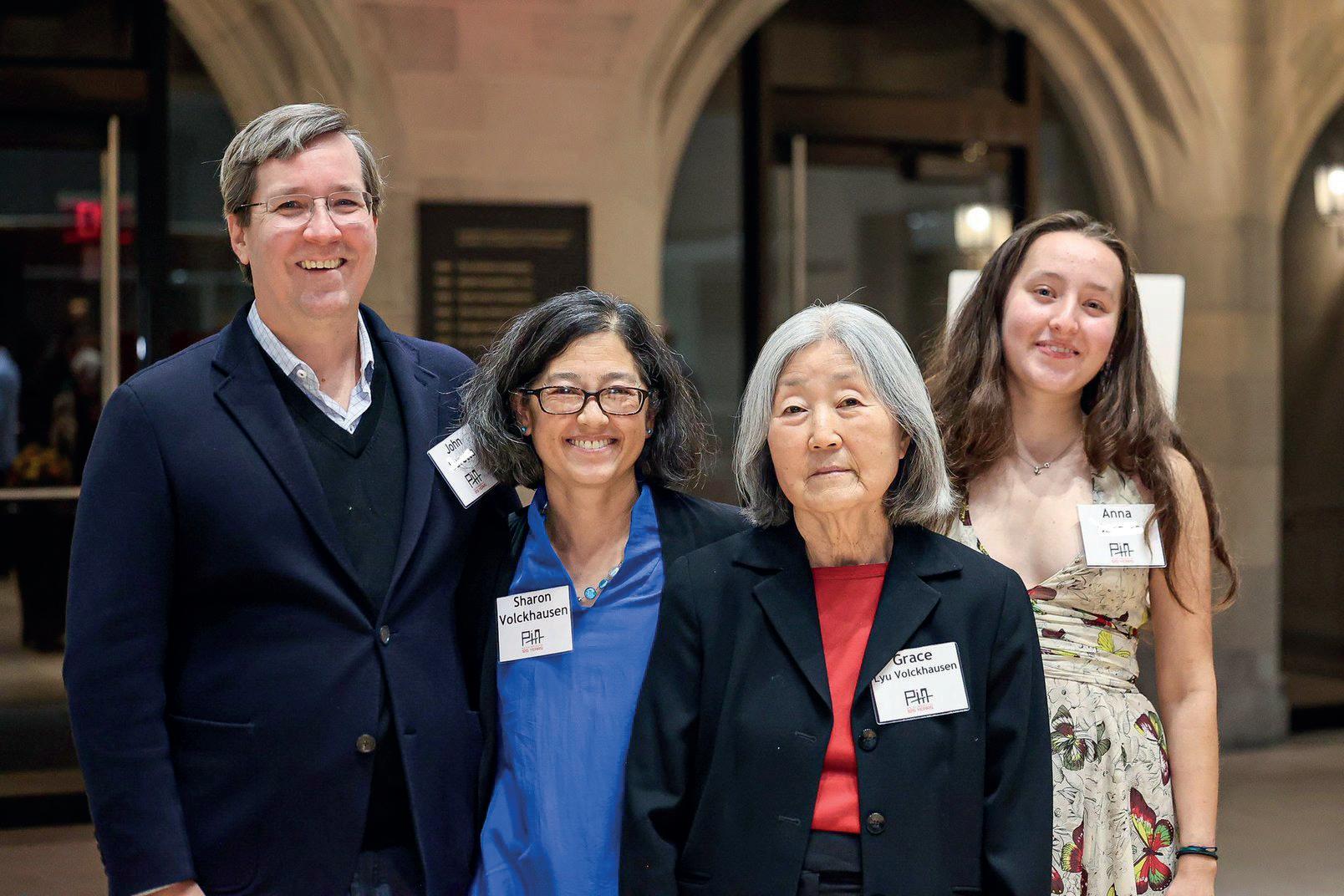
“I visited the country once, but I was only a year old,” she continues, explaining that in Korea, first birthdays are cause for a very important celebration. “I hadn’t been there since. I knew that my grandfather’s family had been cut off during the war, but I was able to spend time with aunts and uncles on my grandmother’s side. I was particularly grateful to have a cousin who was fluent in English!”
Sharon is a trailblazer who comes from a long line of trailblazers. Her mother, community activist Grace Lyu-Volckhausen, came to the U.S. in the 1960s to attend graduate school. “There were very few Koreans living in the U.S. when my mother came here in the 1960s,” Sharon says. “It must have been very isolating. Today, Korean food and culture are easy to access, but this was not the case back then.”
Her father, William Volckhausen (Taiwan ’59-‘61), was the first full-year PiA Fellow after World War II. “PiA shaped the entire trajectory of my father’s life,” says Sharon. “Like me, he was casting about after college. After PiA, he enrolled in a Ph.D. program in Chinese at Berkeley. He did eventually go to law school, and always made room in his life for helping others. For years, he provided legal services for the poor.”
Sharon’s contributions to the community, and PiA are inspiring. She has served on the PiA board for 19 years, holding the post of chair for seven of them, and is only the second woman – and the first Asian-American and person of color – to serve as chair. In addition, Sharon has served on the Carrie Gordon Tribute Fellowship Committee, the Executive Committee, the Diversity, Equity and Inclusion Committee, the Executive Director Search Committee, and the Strategic Planning Task Force, which she chaired.
She has guided the organization through tough challenges and exceptional achievements, presiding over fundraising efforts that doubled the organization’s assets, helping PiA center diversity, equity and inclusion in its work against the backdrop of the Me Too movement, navigating the aftermath of George Floyd’s murder as well as rising anti-Asian hate. She led PiA through the COVID-19 shutdown and was instrumental in preparing the program to re-launch with stronger health, mental health, safety and welfare measures to support Fellows going forward.
In addition to her dedicated involvement in PiA, Sharon serves on the boards of the Brooklyn Bridge Park Conservancy and the Brooklyn Children's Museum, on the advisory board of the Riverkeeper Advisory Board, and the New York advisory board for the Trust for Public Land.
Both of Sharon’s parents were devoted PiA board members, and her brother, Alex (Singapore ’93) is a PiA alumnus as well. He helped PiA celebrate the organization’s 30th anniversary at Ngee Ann Polytechnic. In fact, the entire family has gone above and beyond to ensure that the PiA mission endures. They established the William Volckhausen Fund at PiA to support Fellows engaging in environmental sustainability work, primarily through the Natural Resources Defense Council in China, as well as posts in water management and environmental justice in Sri Lanka and Mongolia. Volckhausen fellowships have enabled the organization to diversify its posts beyond English teaching. The family’s ongoing contributions through the Tiger Baron Foundation have been instrumental to PiA’s goal to eliminate financial barriers to participation. Their pledge of $1.2 million to the Princeton in Asia Campaign will significantly advance PiA’s mission and impact, broadening the reach and accessibility of our fellowship program.
“Giving to PiA helps us increase the diversity of people who can participate in the program,” Sharon points out. “We can bring talented, thoughtful people into PiA, regardless of their financial means. From the beginning, PiA was intended to build understanding across cultures,” she adds. “If we can foster this kind of bridge-building on a larger scale, we will have a better chance of working together to build trust between countries. Every gift to PiA brings us closer to this vision.”
Sharon Volckhausen (second from left) and family members at the PiA Annual Dinner in October 2023.
18
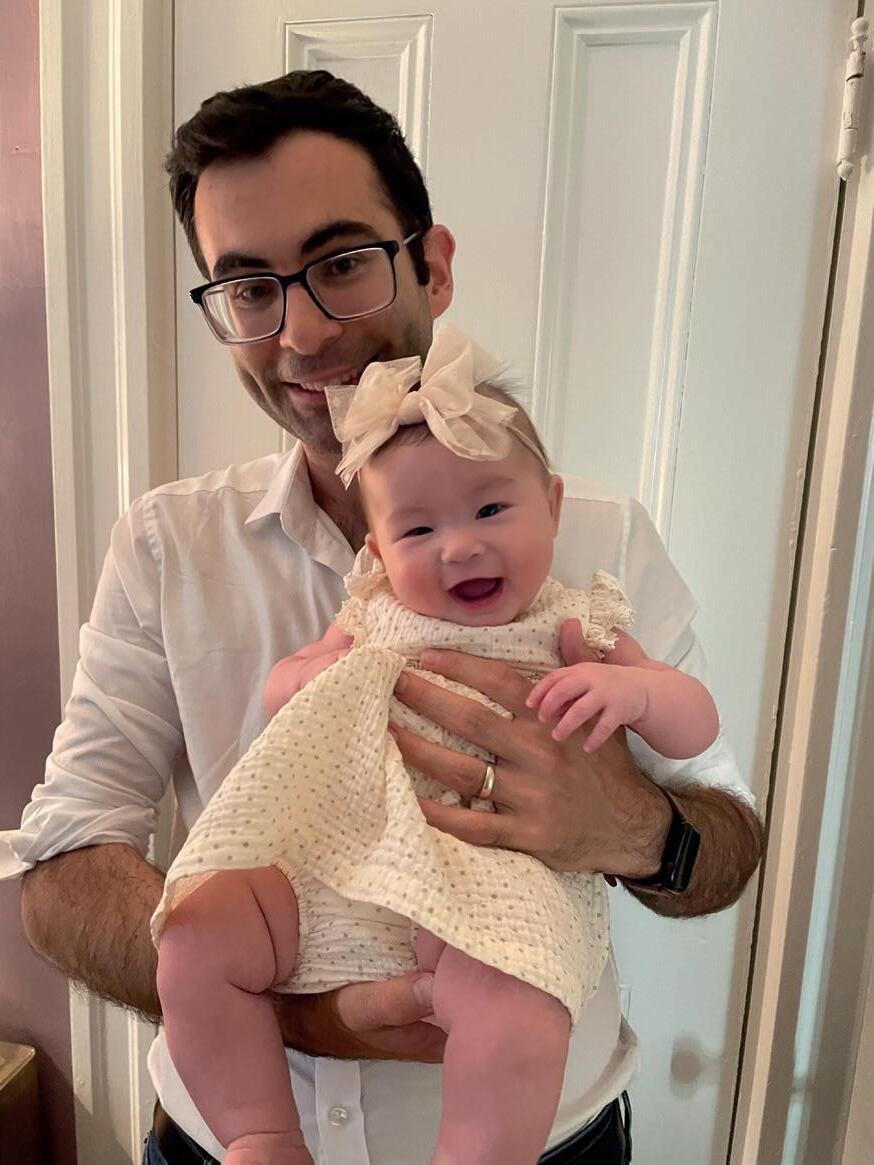
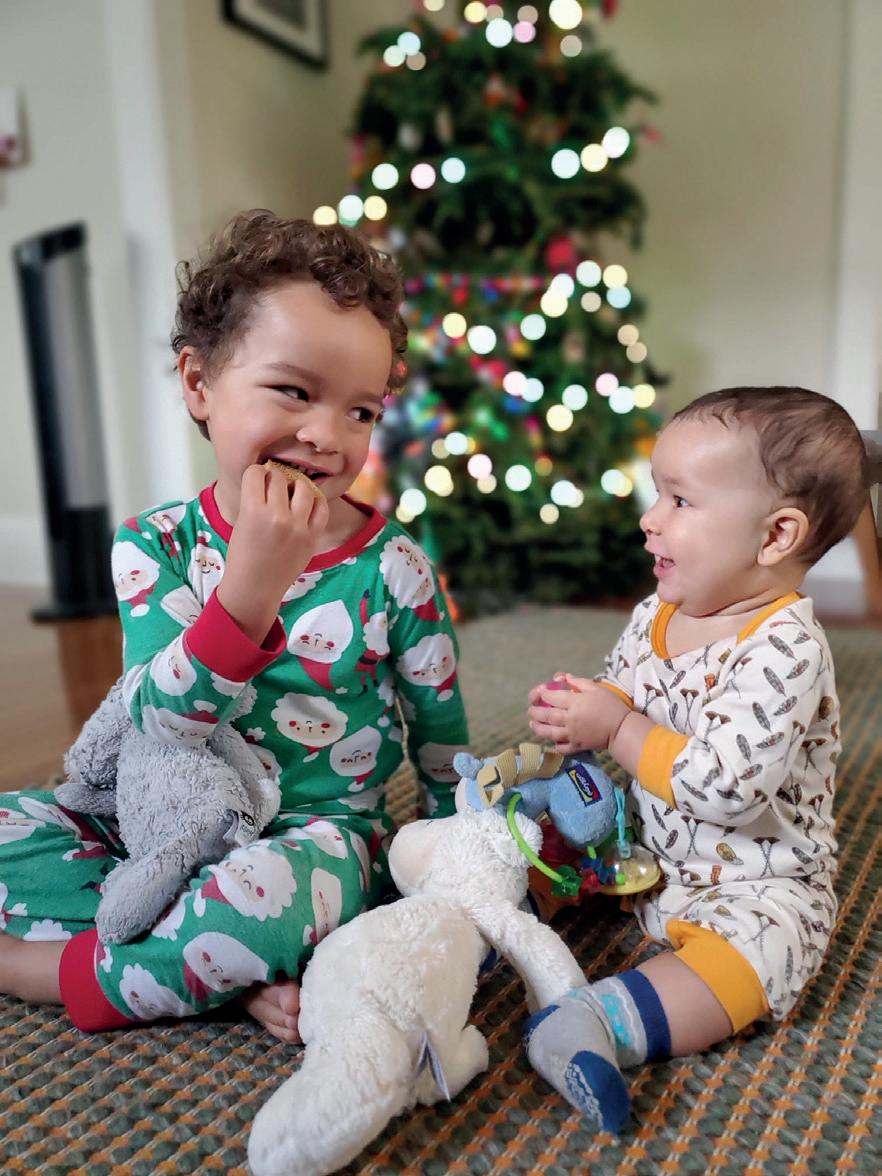
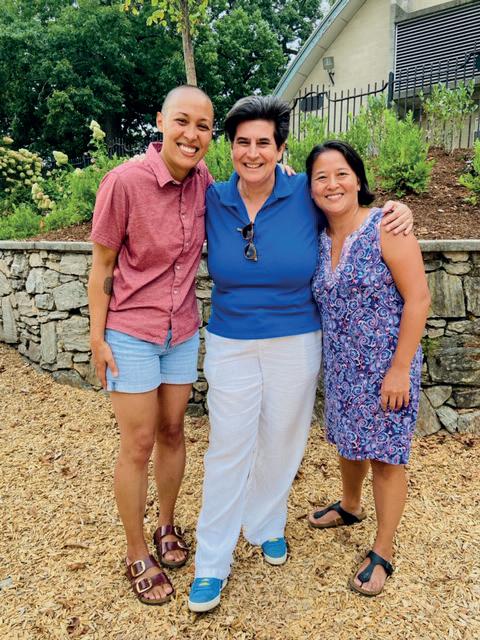
The PiA family is always growing! Hunter Richard (China ‘12) and his wife welcomed their new baby in June of 2023. [1]
Mariesa Lea (China ‘08 and Timor-Leste ‘09) welcomed her second son Miles to the PiA family as well! Big brother James wants to do his future PiA fellowship anywhere that has noodles. Preferably really long ones. [2]
Yongjian Si (Kazakhstan '18) started a new position at UC Davis as the Program Coordinator for the Global Learning Hub at UC Davis.
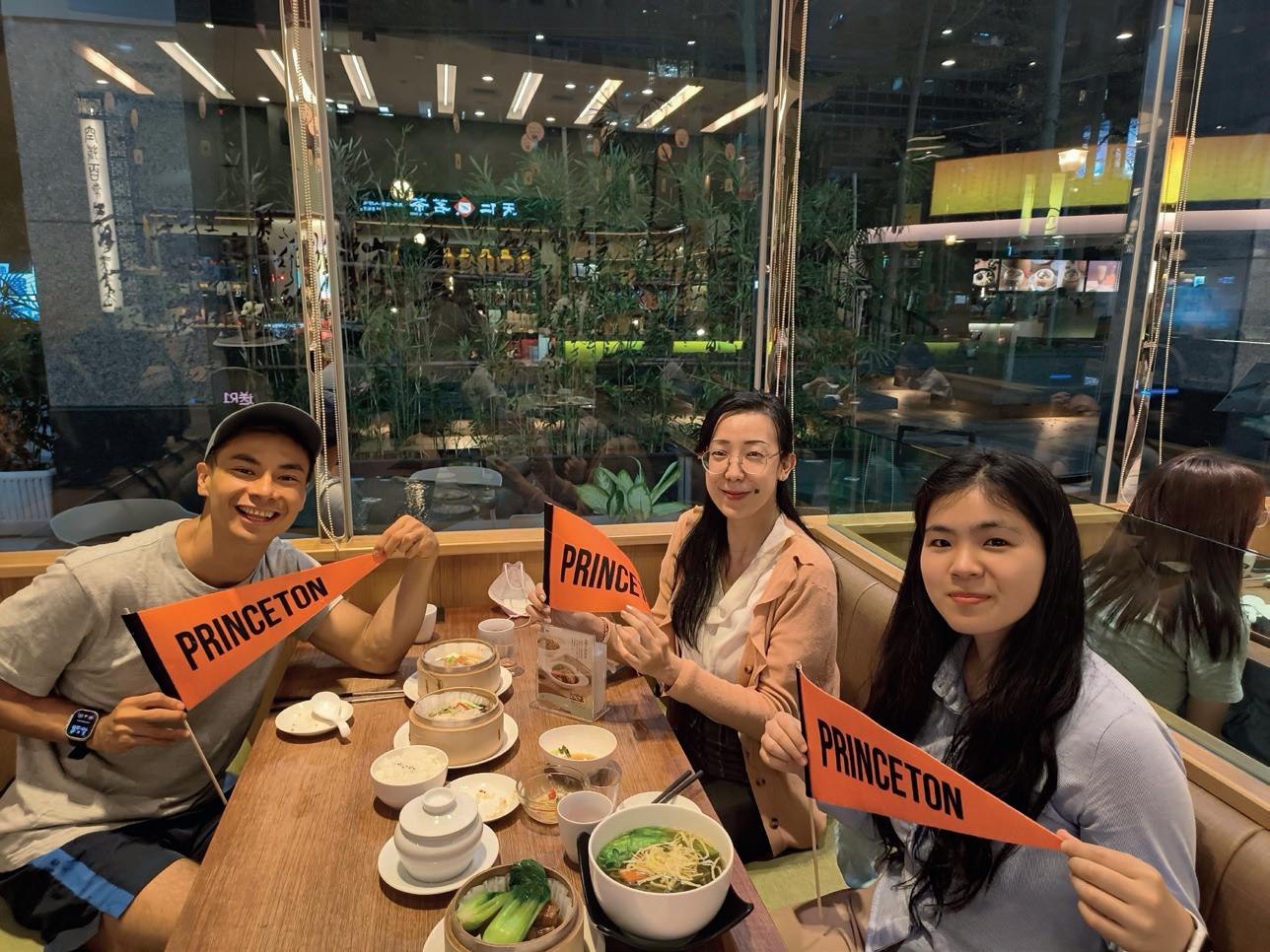
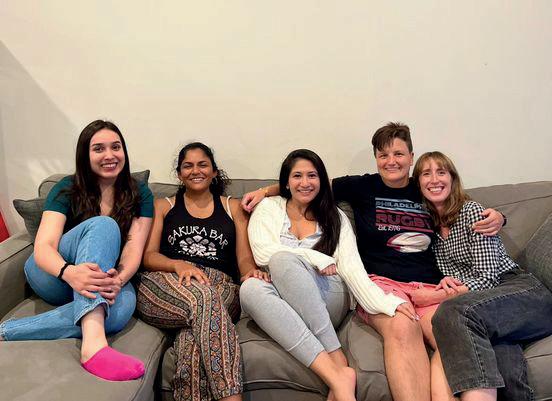
On a trip to Taiwan, Bing Lin (Thailand ‘16) gave a research talk to a group of Princeton University alumni in Taipei and went out afterwards with Taiwan Country Advisor Pei-Ting Sarah Chou and Emily Cheng (Taiwan ‘23). [3]
Andrew O’Riordan (Taiwan ‘03) relocated to Chennai, India in the summer of 2023 with his family for exciting work opportunities for himself and his wife at the American International School Chennai.
Fiona Miller (Indonesia '09 and Former PiA Deputy Director and Director of Asia Operations) and Anastasia Vrachnos (Indonesia '91and former PiA Executive
Director) relocated to Providence, Rhode Island with their family. They met Becca Hunsicker (Taiwan '02-'03) at a parents gathering at the Moses Brown School, where their children are in the same third grade class. It did not take long to discover the shared PiA connection and begin reminiscing about night markets, mapo tofu, cross-cultural bridge-building and community values. [4]
Catalina Ta (Laos’16) and Kathy Rivera (Laos ‘15) hosted an informal reunion of PiA Loas alumni in Philadelphia. [5]
Kristin Lynch (Cambodia ‘11) started a new position in August 2023 as Chief Speechwriter for First Lady Jill Biden.
1 2 3 5 4
ALUMNI NOTES
19

Princeton in Asia
Louis A. Simpson International Building Princeton University Princeton, NJ 08544 www.princetoninasia.org
PiA FELLOW SEND-OFFS
Last summer, we welcomed the Fellow Class of 2023 to the PiA family at four Send-off events across the U.S. Many thanks to the PiA alumni in Boston, Washington, DC, New York, and the Bay Area who organized these events and gave our new Fellows such a warm welcome!
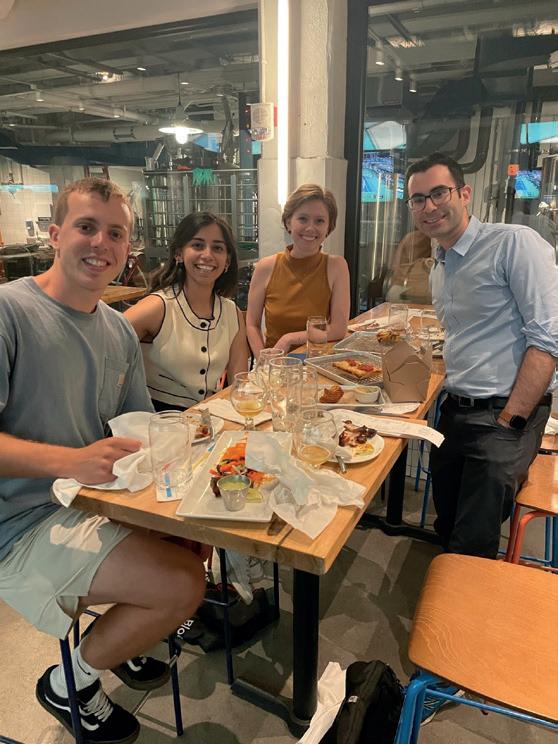
WHAT’S NEW ON THE PiA BOOKSHELF?
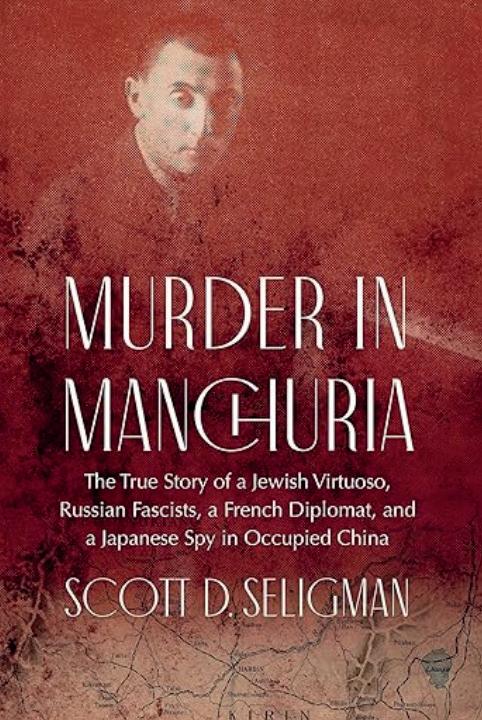
In his latest book, Murder In Manchuria, Scott Seligman (Taiwan ‘73) explores the unsolved murder of Semyon Kaspé, a young Jewish musician who was killed by antisemitic White Russians working on orders from the Japanese military. The story is set amid the chaos that reigned in China against the backdrop of the conflict over control of Manchuria in the run-up to World War II.

Princeton in Asia fellowships change lives and transform perspectives across Asia and the United Statessupport our program with a gift today!
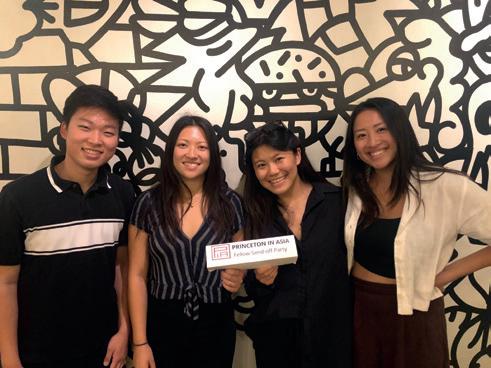
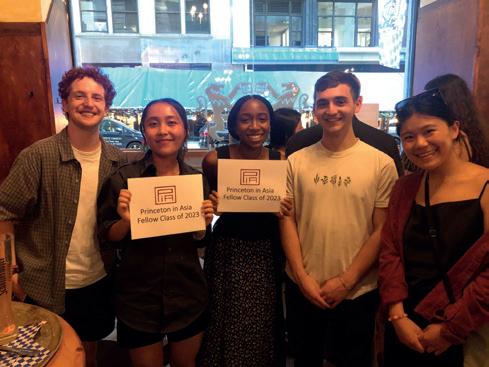

The Way of Mena, the first novel by Angela Yao (Mongolia ‘23), is a captivating story that takes readers on an emotional journey with Mena Sato, a Chinese-Japanese-American woman living in New York City. This thought-provoking novel offers a compelling exploration of identity, belonging, and the consequences of war and discrimination in contemporary America.


Beyond the Braves is a narrative nonfiction account of the 2019 Hong Kong protests and the city's pro-democracy movement. Timothy McLaughlin (Mongolia ‘11 and Myanmar ‘12), who lives in Singapore and writes for The Atlantic, wrote this book with his wife Shibani Mahtani, an international investigative correspondent for the Washington Post.
Boston
Washington, DC
New York City Bay Area
20














 Mags Dillon
Laos ’10-‘12 Executive Director
Mags Dillon
Laos ’10-‘12 Executive Director






 Beth (second from left) and Japan Fellow Sarah Meacham (first from right) celebrate the cherry blossom season in Yakage
L-R Yoshiharu Matsushima, Mayor of Yakage; Teresa Velez Japan ‘08 and Indonesia ‘09 and current Trustee; Mags Dillon Laos ‘10-’12 and Executive Director; Fiona Pratt-MacDonald Japan ‘23; Kenji Anderson Japan ‘23; and Yukihiro Yamagata, Deputy Mayor of Yakage.
Roya teaching young students in a Yakage school.
Beth (second from left) and Japan Fellow Sarah Meacham (first from right) celebrate the cherry blossom season in Yakage
L-R Yoshiharu Matsushima, Mayor of Yakage; Teresa Velez Japan ‘08 and Indonesia ‘09 and current Trustee; Mags Dillon Laos ‘10-’12 and Executive Director; Fiona Pratt-MacDonald Japan ‘23; Kenji Anderson Japan ‘23; and Yukihiro Yamagata, Deputy Mayor of Yakage.
Roya teaching young students in a Yakage school.








































